
Yacht Crew Agency / Candidates / Yacht Salaries Guide

Yacht Salaries Guide
Many of our candidates are asking us for advice on what their salary should be on a yacht.
We have prepared a table of approximate wages in the yachting industry. Even though these salaries may give you a reference point, we would like to inform you that all yachts are different, equally as their owners.
These salary rates are based on the current state of the employment market in yachting in 2024. Real wages always vary depending on the candidate’s experience, training, certificates and additional skills.

Different Salaries of Yacht Crew Jobs
People working on a yacht can earn extras.
Tips are another big financial reward for the team of the superyacht to be rewarded. Specially operating on a charter yacht gives crew a great chance to earn extra money, but how much is expected? It is up to it. Common tips vary from 5% to 20% of the charter cost, sharing about 10% and split by all crewmembers.
Living on a private yacht cannot provide all such advice, but it has its own crew benefits, including greater rest, longer vacations, rewards and also the prospect of the owner’s unexpected donations. Such proprietors are often considered to tip.
Different Position in a Yacht Crew, Different Salary
Without a doubt, each position has a different monthly income. So the higher position you will get the higher salary you will get. Here are an overview about some positions on a yacht.
The Captain must be skilled and trained in maritime affairs, outstanding navigational knowledge, exceptional administration, coordination, strategy and diplomacy. A Superyacht Captain will have outstanding nautical expertise, repairs, electronics, professional procedures and accounting, Finance and administrative records knowledge. A captain must have a cool, charismatic demeanor and must be exceptionally competent to work with men, staff and visitors. Average monthly salary : 60ft (18m) à 2,200€ – 3,700€
During the captain’s absence, the Chief Officer / First Mate will have the captain’s good management and interpersonal abilities and outstanding experience and procedures in ISM and ISPS. The CEO will be someone with a solid history in deck work from prior practice with Deckhand or Boson. Average monthly salary : 60ft < 75ft (23m) à 2,200€ – 3,000€
Under the command and control of the commander, the chief steward must perform his or her duties. The head chef may therefore train and prescribe some lower level stews under his command, as the sole responsible for the interior of the vessel and for offering a satisfactory hospitality service to fulfill the holidaymakers ‘needs. Excellent support, networking and management are a must, as is an innovative environment. Average monthly salary : 100ft (33m) – 140ft (43m) à 2,200€ – 3,000€ +
Morgan & Mallet Yacht Crew Agency helps all yachting professionals find the best job and create a career in yachting
By clicking “Accept All Cookies”, you agree to the storing of cookies on your device to enhance site navigation, analyze site usage, and assist in our marketing efforts.
Hire and Find Experienced Yacht Crew staff
This form is for employers who are looking to hire crew only.
You want to talk to a recruiter to help you personalise your recruitment. Choose a date from the list of available appointments and let us guide you.
Click one of our contacts below to chat on WhatsApp

Social Chat is free, download and try it now here!
Insert/edit link
Enter the destination URL
Or link to existing content

Yacht Crew Salaries: Complete Guide to What Yacht Crew Earn
It’s no secret that the impressive yacht crew salaries attract most people into the exclusive yachting world.
Junior deckhands or stewardesses can earn starting salaries of $3000 per month. With a few years of experience and some courses to back you up, this amount moves up towards $4000-$4500 per month!
In order to compile this superyacht crew salary guideline, I have taken 10 of the top yachting platforms and used all of their data, combined with my personal experience, to reach an average salary expectation for each position.
Table of Contents
How Much do you Make Working on a Yacht?

Yacht Captain Salary
- 20m-30m: $4000-$7500
- 30m-40m: $5500-$9500
- 40m-50m: $8000-$15000
- 50m-70m: $13000-$19000
- 70m+: $16500+
Requirements of a Yacht Captain
- Years of experience needed: 3-5 years of experience as Chief Officer/Mate and more than 5 years of experience as a Captain for larger yachts
- Minimum level of Qualification: 200ton licence which allows you to drive vessels below 200tons
The Captain has the highest level of responsibility onboard the yacht and hence they earn the most out of all the yacht crew salaries.
Captains are accountable for the overall safety of the yacht, crew members and guests.
They also handle daily operations of the yacht, guests, and owner liaison. They deal with management companies, port control, budgets, human resources, and many more tasks and logistics that make the job demanding and stressful.
On top of this, Captains are required to hold high levels of certifications depending on the size of the yacht they are driving.
Yacht Captain salaries can sky rocket with higher levels of qualifications.
If you are looking to become a Yacht Captain one day I recommend looking into the courses required so you can get started with licenses and sea time. It takes time to get there, but when you do it will be worth it.

Chief Officer Yacht Salary
- 30m-40m: $4000-$6000
- 40m-50m: $4500-$7500
- 50m-70m: $5500-$9000
- 70m+: $8000+
Requirements of a Chief Officer
- Years of experience needed: 3-5 Years
- Minimum level of qualification: Officer of the Watch
The Chief Officer is second in command to the Captain and is responsible for carrying out the Captain’s standing orders.
On smaller yachts, the Chief Officer is referred to as the Mate.
The Chief Officer is responsible for carrying out the safety duties onboard and assisting in the bridge with paperwork and navigational planning.
The Chief Officer is also responsible for leading and managing their deck team, ensuring crew are following their duties as well as managing the water sports and guest activities.
The salary of a Chief Officer depends heavily on the license held.

Bosun Yacht Salary
- Years of experience needed: 2-3 years
- Minimum level of qualification: Yacht Master Offshore
- A yacht Bosun salary can vary between $4000 and $6000.
Responsibilities of a Bosun
The Bosun is essentially the Lead Deckhand onboard. A lead deckhand salary on a larger vessel will be similar to that of a bosun salary on a smaller vessel.
This is an opportunity to step up from being a deckhand and gain some experience in a leadership role. This position is in place for larger yachts so that when the Officer is busy with bridge duties, someone is in charge on deck.

Yacht Deckhand Salary
Years of experience needed: 0
- Minimum level of qualification: None needed, however Power Boat Level 2 and Yacht Master offshore will put you at a great advantage
- Entry-level yacht crew salaries start at $3000 and can go as high as $4000/$4500.
Responsibilities of a Deckhand
A Deckhand is an entry-level role on a yacht.
You need to spend a few years (or less) as a Deckhand in order to learn and gain experience so that you can step up in the ranks and obtain your licenses.
This role will be very hands-on in maintaining the exterior of the yacht. Duties will include cleaning, polishing, varnishing, sanding, caulking, and any other maintenance work required.
Chief Steward / Chief Stewardess Salary
- 30m-40m :$4500-$5500
- 40m-50m :$5000-$7000
- 50m-70m- $5500-$8000
- 70m+: $7500+
Responsibilities of a Chief Stewardess/Steward
- Years of experience needed: 3-5 years
- Minimum level of qualification: Depending on the size of the vessel you may need courses such as Food Hygiene and Safety, Silver Service, WSET, or a Purser course
The Chief Stewardess or Steward is responsible for all the interior operations of the yacht .
They are responsible for managing the interior team, and ensuring the interior of the yacht is maintained to the highest standards. Besides cleaning and laundry schedules , this also includes provisioning for crew and guests, budgeting, accounting, and training of junior crew.

Steward or Stewardess Yacht Salary
- Minimum level of qualification: Depending on the size of the vessel you may need courses such as Food Hygiene and Safety and Silver Service
- Salaries start at $3000 and go up to $6000
Responsibilities of a Steward or Stewardess
A Stewardess/Steward is an entry-level position working within the interior of the yacht.
There are rankings within the interior (2nd, 3rd, 4th Steward/Stewardesses). As you spend more time in the industry, you will be promoted to higher ranks, and with that will come a better salary and more responsibility.
This role covers a range of tasks, including but not limited to housekeeping, laundry, bartending, table scaping, floral arrangements, serving, and hosting guests.

Engineer Yacht Salary
- 20m-30m: $4000-$5000
- 30m-40m: $4500-$6500
- 40m-50m: $6000-$8000
- 50m-70m: $7500-$11000
- 70m+: $9000+
Requirements of an Engineer
- Years of experience needed: 2-4 years in an engineering role onboard as Deck/Engineer or relevant land-based experience
- Minimum level of qualification: AEC
The Engineer onboard is responsible for all mechanical functioning and maintenance of the vessel. This is a very technical role that can pay well as you gain experience and obtain your licensing.
Yacht Chef Salary
- 20m-30m: $4000 – $5000
- 40m-50m: $5500 – $75000
- 50m-70m: $6500-$9500
Requirements of a Yacht Chef
- Years of experience needed: 3-5 years depending on previous experience
- Minimum level of qualification: Food Hygiene and Safety Level 2
The Chef is responsible for feeding the crew 2 to 3 healthy and sustainable meals a day. They are of course required to prepare meals for guests when onboard to the highest of standards.
In their day-to-day tasks, they will be responsible for their own provisioning of the galley, maintaining stocks, cleanliness, and hygiene of the galley.
The salary of the Yacht Chef varies depending on qualifications and experience.

Yacht Crew Salaries for Private vs Charter Yachts
There are two types of super yachts that require crew: Private and Charter yachts. The salaries for yacht crew differ slightly between the two.
Private Yacht
A private boat is owned by a single person or family who uses the yacht for their own purposes. They don’t charter it out and you can expect to have the same guests onboard for the duration of your contract.
The benefit of these programs is that you get to know your guests well so you may find it easier to manage their wants and needs.
You may also benefit from traveling to off-the-beaten-track locations as I have!
For yacht crew working on these private boats, you will usually not receive charter tips.
Charter Yacht
A charter boat is one that gets chartered out by guests. This operates as a business and also means you will have different guests for every trip.
If you work on a charter boat you can expect to receive charter tips at the end of each charter. These are usually 10%-20% of the charter fee!
Considering these tips can be anywhere from $2000-$5000 per week depending on the size of the yacht, charter boats offer great earning potential and can skyrocket your salary as a yachtie.

Hi, my name is Lisa, a Chief Stewardess in the yachting industry with 10 years of experience, as well as 8 years of hospitality experience prior to that. Being in the yachting industry has been a whirlwind of adventure, growth, challenges and some of the best experiences of my life, and I am excited to share my knowledge and experiences with all of you.
How to Write the Perfect Yacht CV [With Template]
A day in the life of a yacht stewardess.
Essential Guides
Ocean Mapping
New to Yachting
- Mar 11, 2021
Salary is generally one of the top motivators when choosing a job onboard a yacht, yet it is usually one of the best-kept secrets within the industry.
When negotiating the final salary, it's important that both the employer and employee have an idea of what the standard is for that particular position. This will help keep the transparency and build trust.
To keep their finger on the pulse of the industry and understand the changes that are happening within, YPI CREW set off to launch the yachtingsalaries. com website in 2016. There, every crew member in the industry is welcome to enter their yacht crew salaries along with the position they serve on a yacht. The process is completely anonymous and serves as a way of monitoring the industry's yacht crew salary movements. Yacht crew can also visit the site to check the anonymous data their peers have entered for reference.
The Importance of Yacht Crew Salaries Reports
Informed employers recognise that in order to attract the top level of talent and experience for a particular role, one of the strongest influences they have is the salary they can offer. To stay competitive within the yachting industry you have to offer competitive yacht crew salaries that reflect the current marketplace. And in order to do this, you have to know what the current market rate is.
Equally, employees can use a yacht crew salary report such as this as a guide point to get an idea if a job offer is reflective of the industry and the role they serve.
The Crew Salaries Data and How We Collect It
In 2016, YPI CREW launched a peer-to-peer salary comparison website for the yachting industry. Here, anyone working in the industry is welcome to anonymously enter their yacht crew salary along with their rank.
has so far attracted over 5.655 entries since its launch in 2016, providing an informative yacht crew salary guide for employers and employees. Best of all, the salary data is free for anyone to access.
The figures shown here are median values of the real salaries entered by yacht crew. They can be used as orientational figures but the real salary offered during the recruitment process will vary depending on the candidate's experience, training, certificates, and additional skills. This is why, when looking for work, it's important to have someone guiding you and championing your skills and experience.
All yacht crew salaries are expressed in euros. Please note that the blanks in the graphs are due to either lack of entries for that particular category or the nonexistence of a role in a specific segment. For example, there are generally no third officers on yachts smaller than 50 meters.
To visit the site to contribute your salary or conduct a free search of the salary database, visit
Data presented here is collected from anonymous yacht crew members. It should not be seen as a definite portrayal of the current market but merely an informal indication.
As salary data is entered by members of the community the site works on an honesty system. There is really no incentive for contributors to mislead people about what they earn. Any inflated or inconsistent salary entries can be 'flagged' as suspicious by other members of the community or by YPI CREW and quickly removed from the system to ensure the accuracy of data is maintained.
Yacht Captain Salaries
347 captains have contributed their salaries. Of those, 287 (82%) are working on motor yachts and 60 (18%) on sailing yachts. This is coherent with the ratio of the global world yacht fleet. 83% of which are motor yachts and 17% are sailing yachts. Overall, only 33% of captains who contributed are on rotation. Rotation usually, if and when available, starts on yachts over 50m. When talking about sailing yachts, we didn't receive any entries for sailing yachts above the 51-65m segment. Also, salaries were on average slightly lower on sailing yachts compared to same-sized motor yachts.
Yacht Captains present the most senior management of a yacht, which is obviously reflected in the salary they command. Expectedly, with the size of the yacht increasing, so do salaries.
Experienced recruiters are invaluable at this level as they can definitely add value in the salary negotiation stage; it is their role to act as a middle person to ensure that, when a job offer is made, it is to all parties' satisfaction and is therefore accepted. They not only know how best to champion captains, their skills and experience at interview stage; they help craft and finesse a deal.

2020 Yacht Crew Salaries for Motor Yacht Captains

2020 Yacht Crew Salaries for Sailing Yacht Captains
Deck Crew Salaries
214 Deck Crew have contributed their salaries, broken down as 116 Chief Officers, 16 Second Officers, 12 Third Officers, and 64 Deckhands.
From the data, we see that fewer Chief Officers (43%) reported having a rotational position compared to Second Engineers (57%). However, they reportedly benefit more from rotation than Captains who are at 33%.

2020 Yacht Crew Salaries for First or Chief Officers

2020 Yacht Crew Salaries for Second Officers

2020 Yacht Crew Salaries for Third Officers or Bosuns

2020 Yacht Crew Salaries for Yacht Deckhands
Engineer Salaries
279 technical crew have contributed; 162 Chief Engineers, 60 Second Engineers, 16 Third Engineers, and 25 ETO/AVIT.
Overall, many more Engineers reported being on rotation than Captains. We see that 72% of Chief Engineers, 57% of Second Engineers and 56% of Third Engineers are rotational, along with 88% of ETO/AVIT Engineers.
For Chief Engineers we note that beyond the 66 – 80m segment, there is no data for permanent salaries. This reflects the engineering recruitment market where in fact, from +65m upwards, the market is rotation only, apart from a few exceptions. The same goes for Second Engineers and ETOs where permanent contracts on +65m yachts are for build contracts only. It is our experience that the market is rotation-only for Engineers on operational yachts over 65m.

2020 Yacht Crew Salaries for Chief Engineers

2020 Yacht Crew Salaries for Second Engineers

2020 Yacht Crew Salaries for Third Engineers

2020 Yacht Crew Salaries for ETO, AVI & Electrical Engineers
Chef Salaries
65 yacht Chefs contributed with their salaries, of which 50 were Head Chefs and 15 Sous Chefs.
It is our experience that at the point of recruitment on yachts +50m, most yacht Chef jobs offer some sort of rotation, so it surprising that only 26 % of Chefs who contributed are on rotation.

2020 Yacht Crew Salaries for Yacht Head Chefs

2020 Yacht Crew Salaries for Sous Chefs
Pursers & Stews
34 Pursers, 61 Chief Stews, and 22 Second Stews contributed their salaries.
Pursers, after Engineers, are the category who most have access to rotation. 59% of Pursers reported having rotation whilst only 18% of Chief Stews said they benefit from that perk.
Our experience is that in the past year, perhaps due to Covid-19, salaries offered to Stews were somewhat lower than the year before.
This underlines again the added value of registering and teaming up with recruiters who have their fingers on the pulse and are able to assist in negotiating the best conditions for job offers. Each situation is unique. Likewise, the same recruiters will advise Captains on the state of the crew market and how to position themselves in terms of conditions and salary to attract the best suitable, interested and available candidates

2020 Yacht Crew Salaries for Yacht Pursers

2020 Yacht Crew Salaries for Chief Stews and Stewardesses

2020 Yacht Crew Salaries for Second Stews and Stewardesses

2020 Yacht Crew Salaries for Yacht Stews and Stewardesses
Most read articles

Tips & Tricks
How many crew members are needed on a yacht?

How to Find A Caribbean Yacht Job

Yacht Job Offers
Open Yacht Crew Jobs In April 2024

How to Become A Yacht Purser: Interview with Purser Trainer Angela Wallace

YACHT CREW GUIDES
IS YACHTING THE RIGHT CHOICE FOR ME?
Essential yacht guides

Mandatory certificates

What you need to know about B1/B2 visa

How to prepare for a yacht interview?
Read more latest news

Olympic Grit and Resilience: What Yacht Crew Can Learn from Elite Athletes

YPI CREW Announces its 2024 Superyacht Recruitment Market Report

Mind the Gaps: How to Explain Employment Breaks on Your Yacht Crew CV

YPI CREW Yacht Crew Salaries Report 2020
INDUSTRY NEWS

HOW TO WRITE A MEMORABLE YACHTING CV

YACHT CREW SALARY GUIDE
Error 404 — page not found, we’re sorry, we couldn’t find what you were looking for.
Please return to the YPI CREW homepage
Let’s get started. Call us on +33 (0)4 92 90 46 10 or email us.
Our mission, vision and values, mlc 2006 compliance, essential guides, yacht crew positions.
Chief Officer
Second Officer
Third Officer
Chief Engineer
Interior Crew
Head of Service
Head of Housekeeping
Specialist Positions
Spa Manager
Spa Therapist
Personal Trainer & Yoga Instructor
Hairdresser
Mandatory Certificates
B1/b2 visa information, how to write a memorable cv, how to prepare for an interview, yachting seasons, yacht crew salary guide, is yachting the right choice for me, cv templates, ocean mapping, new to yachting.
+33 (0)4 92 90 46 10
Back to Blog
Captains Clients Superyacht Industry Insights
Superyacht Captain salary survey 2023 18 December 2023
captain salary survey crew salary survey superyacht captain superyacht salaries yacht captain
In our biggest salary survey yet, we have uncovered detailed insights into Superyacht Captain salary and leave packages.
Almost 300 Captains responded across a range of yacht sizes from sub-30m to 100m+. In addition to average pay and leave, pay rise and bonus activity, the 20+ page report also compares Captain and Chief Officer experience, ticket level, longevity onboard and comparisons to our 2020 and 2022 survey findings.
Some top-level statistics are:
- Every yacht bracket has seen a salary rise since 2020 and 2022.
- Full rotation is also increasing and becoming more prevalent on sub-50m yachts, with an 11% decline overall in Captains with less than 59 days leave.
- Two-fifths of Captains receive an annual pay rise, although this is not part of their contract.
- 38% receive a 13th-month bonus, but random and unpredictable bonuses are more commonplace.
- 70% of Captains have Master 3000.
- Exactly half of the Captains who responded have more than 10 years’ experience in the role and 32% were Chief Officers for 3 to 5 years prior.
- A third have been Captains on their current yacht for more than 3 years.
- Flight allowance improves with yacht size, with 49% of Captains receiving Business Class flights as part of their package.
- The average age at which respondents first became Captain is 32.5 years old.
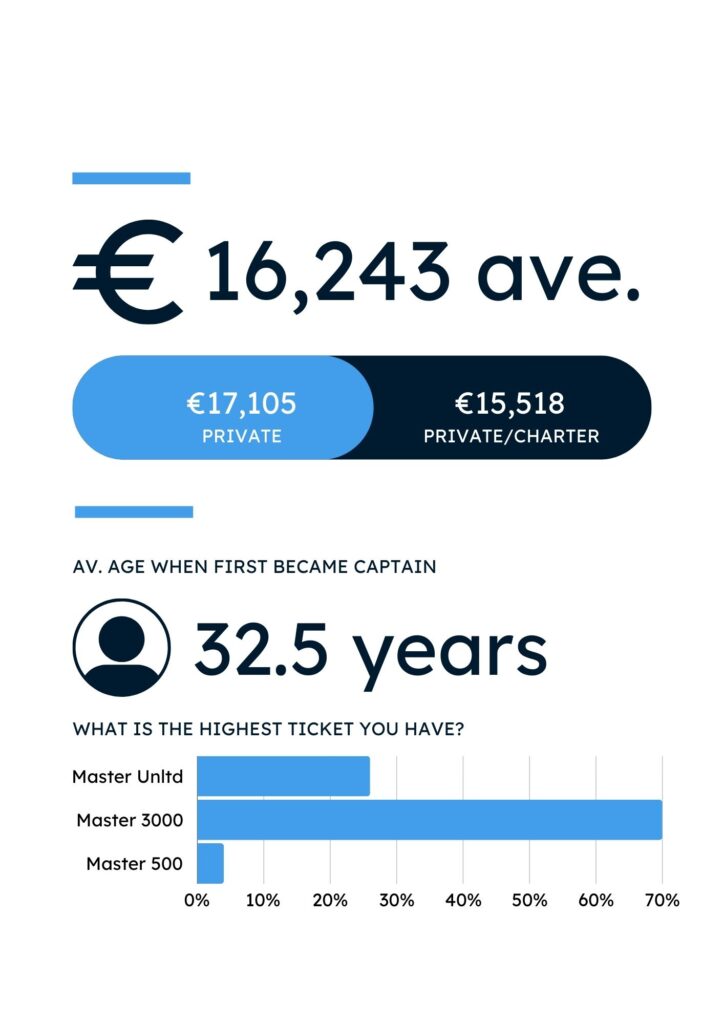
The full report contains a comprehensive analysis of salaries and leave in each yacht size bracket and also compares full time with rotational roles, as well as explores any correlation between experience and type of ticket.
Simon Ladbrooke, Captain Consultant at Quay Crew, commented:
“In our most detailed salary report to date, we have gained an insight into the real-time compensation Captains receive, broken down by yacht size and with several other comparables too.
“A key takeaway this year is that, despite a slight decline in salaries between 2020 and 2022, the average monthly pay is now higher across all size brackets, representing a median 6.75% increase.
“Time for time rotation has also grown in popularity on all sized yachts, with the exception of <39m yachts which are all full-time at the moment.
“By gathering Chief Officer experience as well as longevity on their current yacht, we can surmise that onboard promotion is on the rise. The average age that someone becomes Captain is now older and the number of years of experience as Chief Officer is higher, suggesting the transition is also taking longer.
“This is undoubtedly down to there being more competition amongst candidates and it being more difficult to make that initial step up.
“Yet, almost three-quarters say it took them less than 6 months to get their first Captain role. This could be, along with the extensive CO experience demonstrated in this survey, largely down to onboard promotion.
Having said that, we were very surprised at this statistic as it doesn’t match at all with our experience. Often, Chief Officers are looking for several years before they finally get their opportunity. It’s something we definitely want to explore further in another survey.”
All HOD salary surveys are available on our client portal, which you can request access to here.

About the author
Simon Ladbrooke
Compassion at christmas: the yachting edition, interview questions to ask as a captain candidate.
- Superyacht Recruitment Services
- Superyacht Captain Recruitment
- Partnerships
- Meet the Team
- Work for Us
- Current Vacancies
- Crew Resources
- Candidate Login
- Candidate Registration
- Client Login / Register
- Candidate Login / Register
Impartial training and careers advice
Call us: +441983 280 641
+441983 280 641
Superyacht Crew Salary Guide – 2023
- Superyacht Crew Salary Guide – 202...
Working as a crew member on a Superyacht has some incredible perks…
… from being on the ocean and seeing new countries to brushing shoulders with the rich and famous and, of course, earning an amazing salary.
As we begin 2024, we thought it a good opportunity to look back at 2023 to see how the industry faired and whether there have been any changes to salary, tips, and working conditions.
The good news is that things have got better! Since the pandemic, the Superyacht industry has seen significant growth the industry has grown significantly over the last couple of years .
As the number of Superyachts being built increases, so does the demand for crew; there has never been a better time to enter the industry.
Typically, the entry-level salary for a Deckhand and Steward/ess ranges between €2,000 and €3,500, rising to €4,000+ for more senior roles. A Captain can make €10,000+ per month, depending on the size of the Superyacht!
Moreover, as you’ll be living onboard the yacht, there are no living expenses to worry about. Your meals are prepared by the Chef onboard, too, and you rarely need to buy groceries or toiletries.
We can’t talk about Superyacht Salary without mentioning tips. The majority of Superyacht owners charter their yachts as the ultimate holiday experience! A Superyacht does not come cheap, with some chartering for One Million per week! Guests normally leave a tip and around 10% of the charter fee, which is shared equally among the crew. It is not unheard of for a Deckhand or Steward/ess to receive a €5,000 tip after a week’s trip!
Another huge benefit contributing to the amazing Superyacht salary is the potential for tax-free earnings (typically paid in Euros)!
Read on for our complete guide to the Superyacht crew salary for 2023…
How much do you make working on a Superyacht?
In short, your salary will depend on the role you work in on the Superyacht, in conjunction with its size; however, the average salary is €2,500 per month (most boats pay in Euros rather than pounds).
Several other factors will determine Superyacht crew salary, too, including previous experience, qualifications, and extra skills (such as Dinghy Instructor, Carpenter, and Divemaster, to name a few).
Whether the yacht is chartered or privately owned will all contribute to your monthly pay packet; your basic salary will be the same whether you work on a charter yacht or a private boat, though on a charter, you will generally receive tips; this usually around 10% of your monthly salary, or it can range between €1,500 to €5,000+ .
We’ve shared current Superyacht salary approximations for 2023 in the table below:
How much do you make working on a yacht?
| Captain | €4,000-€7,000 | €7,000-€14,000 | €14,000+ | €16,000+ |
| First Officer | €3,000-€5,000 | €4,300-€5,700 | €6,000+ | €7,000+ |
| Bosun | €3,200-€4,500 | €4,000 | €5,000 | |
| Chief Stewardess | €3,000-€4,500 | €4,000-€6,000 | €6,000+ | €7,000+ |
| Experienced Stewardess | €2,800-€3,000 | €2,800-€3,500 | €3,500+ | €4,500+ |
| Experienced Deckhand | €2,800-€3,500 | €2,800-€4,000 | €3,500+ | €4,500+ |
| Junior Stewardess | €2,000-€3,000 | €2,000-€3,000 | €3,000+ | €3,000+ |
| Junior Deckhand | €2,000-€3,000 | €2,000-€3,000 | €3,000+ | €3,000+ |
| Chef | €3,000-€4,500 | €4,000-€7,000 | €6,000+ | €7,500+ |
Here’s a breakdown of Superyacht crew salaries in more detail by role:
Superyacht captain salary – €4,000 to €16,000+.
A Superyacht Captain is responsible for all activity onboard, crew safety and well-being, and the experience offered to guests.
The Captain is the owner’s main point of contact on the yachts; whether things are going right or wrong, it can be a highly pressured and stressful job.
The salary reflects the responsibility in this high-pressure environment, and the range in salary normally depends on experience and the boat’s length.
Generally, larger boats will carry more guests and staff; therefore, the Captain will have higher responsibilities, a bigger budget, and more challenges to cope with.
First Officer salary – €3,200 to €8,000+
The First Officer, also known as Chief Officer or Chief Mate, is always second in command to the Captain.
They will assist the Captain in a wide range of duties and tends to be responsible for the safety of the Superyacht and everyone on board. Furthermore, the role of the First Officer also includes bridge watches and navigation.
Due to needing a firm understanding of working on deck, the First Officer normally starts their career as a Deckhand and progresses from there.
If you are an experienced First Officer and have moved onto larger yachts, then your next step will be to become a Captain.
Superyacht Bosun salary – €3,200 to €5,000+
Otherwise known as the Senior Deckhand, the Bosun is the ‘line manager’ of all Deckhands on the boat. The responsibilities of the Bosun are to manage and maintain the exterior of the yacht to the highest order.
This role also includes spending time with the guests, making sure they are having fun and are safe on all the toys the Superyacht has, such as jet skis and dinghy sailing boats.
Chief Stewardess salary – €2,800 to €7,000+
The Chief Stewardess is responsible for the interior of the Superyacht. Attention to detail, elegance, and cleanliness is paramount for this role.
Moreover, you will be required to perform duties discreetly and anticipate the requests and demands of guests, as well as manage your team of Stewardesses. A managerial background in hospitality will, therefore, help for this role.
Generally, the Chief Stewardess will have gained previous experience in an entry-level Stewardess role and fully understands the functions of a working Superyacht.
Superyacht Stewardess salary – €2,000 to €3,500+
This is an entry-level position working on board a Superyacht.
Open to Male and Female
Being a Superyacht Stewardess is a wide-reaching role covering three main areas: Service, Housekeeping, and laundry. Your actual day-to-day activities can vary depending on the type of yacht (private or charter), owner, and Itinerary. You will be the host, cleaner, florist, and housekeeper, and collectively responsible for looking after the guests 24/7.
If you are looking at not going to uni , and want a career with real progression and a very good salary, becoming a Superyacht Stewardess could be for you! If you would like to start a career as a Stewardess, then consider joining our Superyacht Steward/ess course.
Superyacht Deckhand salary – €2,000 to €3,500+
This is another entry-level role to work on a Superyacht.
Open to male and female
A very hands-on role, the Deckhand is responsible for the exterior of the yacht, and tasks will typically involve cleaning, painting, sanding, varnishing, and all general maintenance of the boat.
As with all Superyacht roles, working as a Deckhand requires some skills and qualifications before you start looking for work. The good news is that you don’t have to go to Uni to get whats required. You will be able to get qualified in a few weeks.
How to become a Superyacht Steward/ess or Deckhand.
If you want a career in the Superyacht Industry, we are here to help. Contact us by phone, email, or live chat. Alternatively, book a meeting with one of our career advisors.
Looking for more information on working in the Superyacht industry?
Download our free guide and learn all there is to know about working on a superyacht as a deckhand or steward/ess., related articles.
- Seafarers Tax
5 ways to ensure your SED claim is rock solid
The Seafarers’ Earnings Deduction, often referred to as the SED, is a tax legislation that enables seafarers to claim back their UK income tax. It a...
Do I need to pay off my Student loan if I work on a Superyacht?
Good question! First, let me say that the information below is aimed at people who have studied in the UK and took out a Student Loan to cover course ...
Have I got the right experience to work in yachting?
If you’re thinking about working on board a Superyacht, we share the skills and experience you need and how to get into the yachting industry in thi...
Working On Yachts
There are currently over 15,000 yachts in the world large enough to require professional, qualified yacht crew and as a result this industry is growing rapidly each year.
A career in yachting can be rewarding, exciting and a wonderful opportunity to travel the world and explore new horizons!
Wherever there is water, you have the potential to go. Traditionally the yachting industry in the Mediterranean runs from April until September and from November to April in the States & Caribbean. Having said that, the possibilities are endless with many yachts circumnavigating the world.
Yachting is an eye opening, ultimately fun industry that demands hard work, perfection and attention to detail. We work with yacht crew every day and have a deep insight into what new crew should do to make the most of their career. Here are our top ten tips for starting out.
You cannot work on board a luxury yacht without getting your basic qualifications first. Bluewater offers a full range of crew training courses for those just starting in the industry:
- STCW 95 Basic Training 5 Day Course
- Powerboat Level II 2 Day Course
- Interior Introduction 3 Day Course
- AEC 1 5 Day Course
We have a sample copy and lots of relevant advice on creating your first yachting CV within our 'Your CV' section.
Certain times of year are more favourable for new crew looking to join the industry. If you are going to Antibes or Palma, we advise end of March/April. Fort Lauderdale is different in that it is sunny most of the year, however there is a peak recruitment season around November each year.
In every yachting hub you will find english speaking bars and cafes filled with yacht crew. Make sure you go and explore to build your network within yachting. Although global, it is a small industry so make sure to present yourself professionally.
Finding your first position in yachting is the hardest. Make sure you are dock walking, looking for day work opportunities and handing out your CV. You may find that one day's work leads to a permanent role or other job interviews.
Read websites, follow yachting news, learn from other crew who were in your 'deck shoes' a few years ago. Good examples of yachting websites & magazines are:
- Bluewater bluewateryachting.com
- Dockwalk dockwalk.com
- The Crew Report thecrewreport.com
- The Triton thetriton.com
Apply for jobs, manage your course bookings and sign up for events.
You can buy pay as you go SIM cards either in newsagents or specialised telephone shops around the Mediterranean. This will help to save you money when job hunting!
Captains check Facebook and Twitter pages before interviews. Make sure any public images of you are professional and will not reduce your chances of employment. Once employed be sure to avoid any posts about your yachts, current location and inappropriate images.
A smart, professional appearance will win over shorts and a beach top.
The most important aspect when you are looking for work is to make sure your CV is up to date, well written and includes any relevant experience that you might have.
It is best to emphasize any hospitality experience or customer service skills you may have had, such as waitressing, hostessing, silver service, bartending, cooking, nanny/au-pairing, babysitting, flower arranging, cleaning and/or laundry experience.
Should you wish to join the engineering department, make sure you include all mechanical experience and qualifications, including all work done in refrigeration, air conditioning, work with engines, and any electrical work, electronics or AV/IT.
The most important aspect to include is any recreational sailing experience you may have had. If you are also qualified or experienced in woodwork or carpentry, have painting, polishing, varnishing know-how, then that is also great. In addition any diving, sailing, fishing, any water sports background are all fantastic skills that are easily transferable.
We deal with a great multitude of chef positions, ranging from crew chef to head chef. Most positions will require some form of culinary training, however some crew succeed in entering this department through the stew/cook route on a smaller yacht.
When filling in your online profile with us, make sure to only select positions that you are qualified to do onboard. Selecting more than 3-4 positions on your profile can confuse potential employers and effect our search results.
Your CV should be no more than two sides of A4, including your photograph (in colour, face on, without sunglasses).
Your CV should be in a word format to ensure it can be opened easily by all employers.
List all recent contact information, references and work history.
Including a personal statement, along with a clear objective can help distinguish you from other candidates and helps prospective employers grasp your long term goals.
Don't give employers an excuse to dismiss your CV, review and spell check it!
Salary Guidelines

Knowledge is power and the more you research, the more informed & on the ball you will be.
Make sure you have a printed copy of your CV with you and always arrive early and dressed in a smart way. Research the yacht, make yourself prepared & don't be afraid to ask questions.
The key to getting your first job is to network! Always carry a copy of your CV with you.
Remember the industry is a tight, professional network therefore it is crucial to communicate with others, walk the docks, distribute your CV and register with crew agencies. Bluewater is one of the longest-established crew agents - we have been finding people yacht jobs since 1991!
Keep the agencies up to date! Always make sure your profile has the correct location and contact numbers for you so we can get hold of you when we have the perfect role for you.
Your profile is essential to us finding you work, both now and in the future. We rely on the information you input to match you to the right jobs, so please make sure it is up to date and at least 85% complete. We receive thousands of vacancies each year, and search our database for the best candidates for each one... You will hear from us more often if you are checking in regularly! Once you find work you can set your profile to 'Not Available'.
YPI CREW Releases 2023 Yacht Crew Salaries Report
YPI CREW, a leading yacht crew recruitment company, has released its 2023 Yacht Crew Salaries Report following a positive and fast-paced year in yacht crew placement. The report outlines trends in the industry and emphasizes the importance of flexibility in attracting top talent.
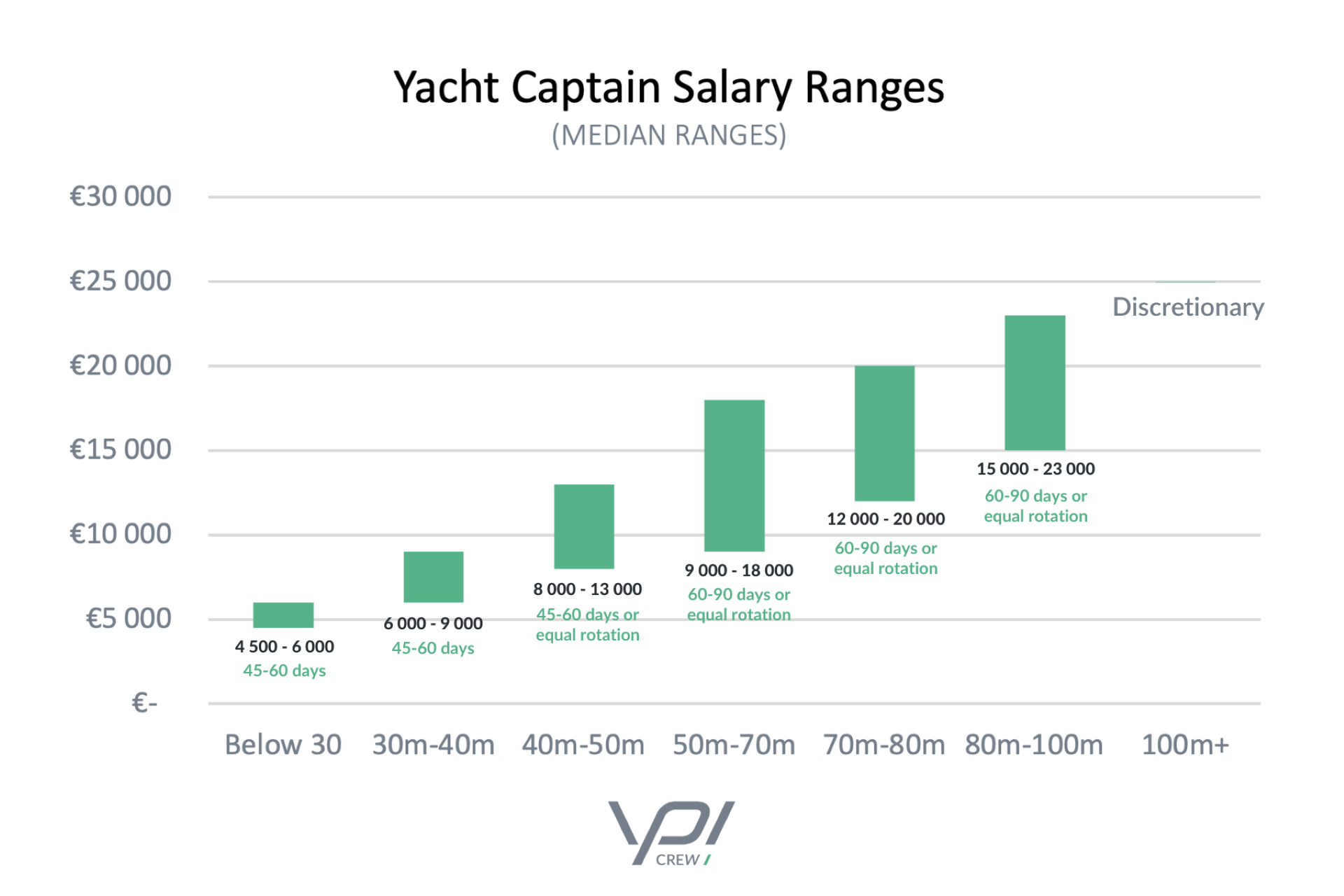
2022 marked a significant shift in the yachting industry, as the effects of Covid-19 began to wane. One key trend that emerged was the extension of scheduled or rotational leave to positions outside of the engine room and the bridge. Crew members are increasingly focused on achieving a harmonious work-life balance, leading yachts to adapt their leave packages to remain competitive.
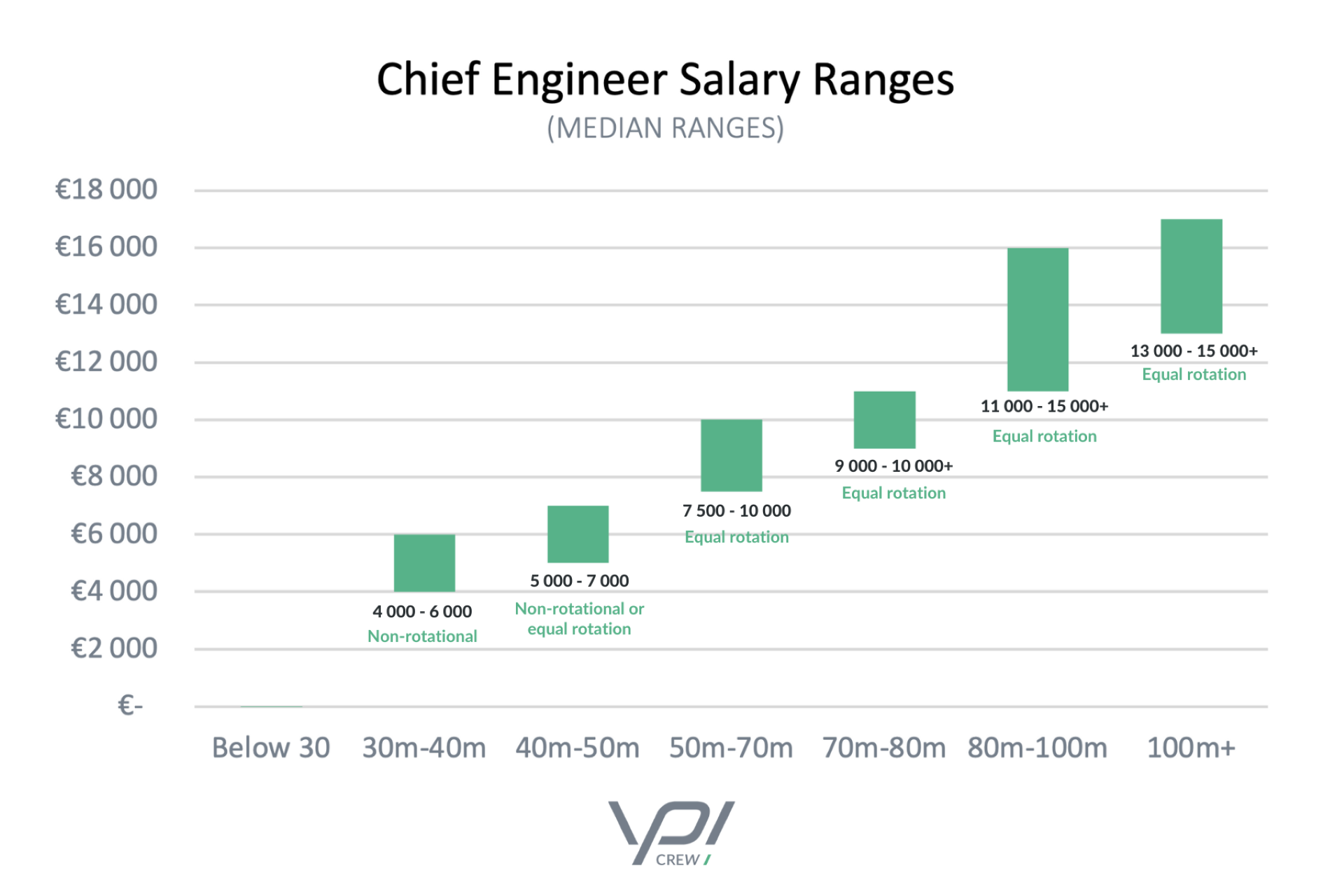
Flexibility with regards to leave has become a key factor for all departments and allows for a larger pool of candidates who are fully committed to the yacht, its programme and owner.
Both the Deck/Bosun’s and the Interior/Galley Departments have witnessed a steady trend towards increased leave packages. Senior Stews, for example, now seek a minimum of 90 days leave, and 95% of Chief Stews look for full rotation. Stew Head of Departments have come to realize the benefits of scheduled or rotational leave, a perk that was once reserved for Engineers or Officer/Captains Departments.
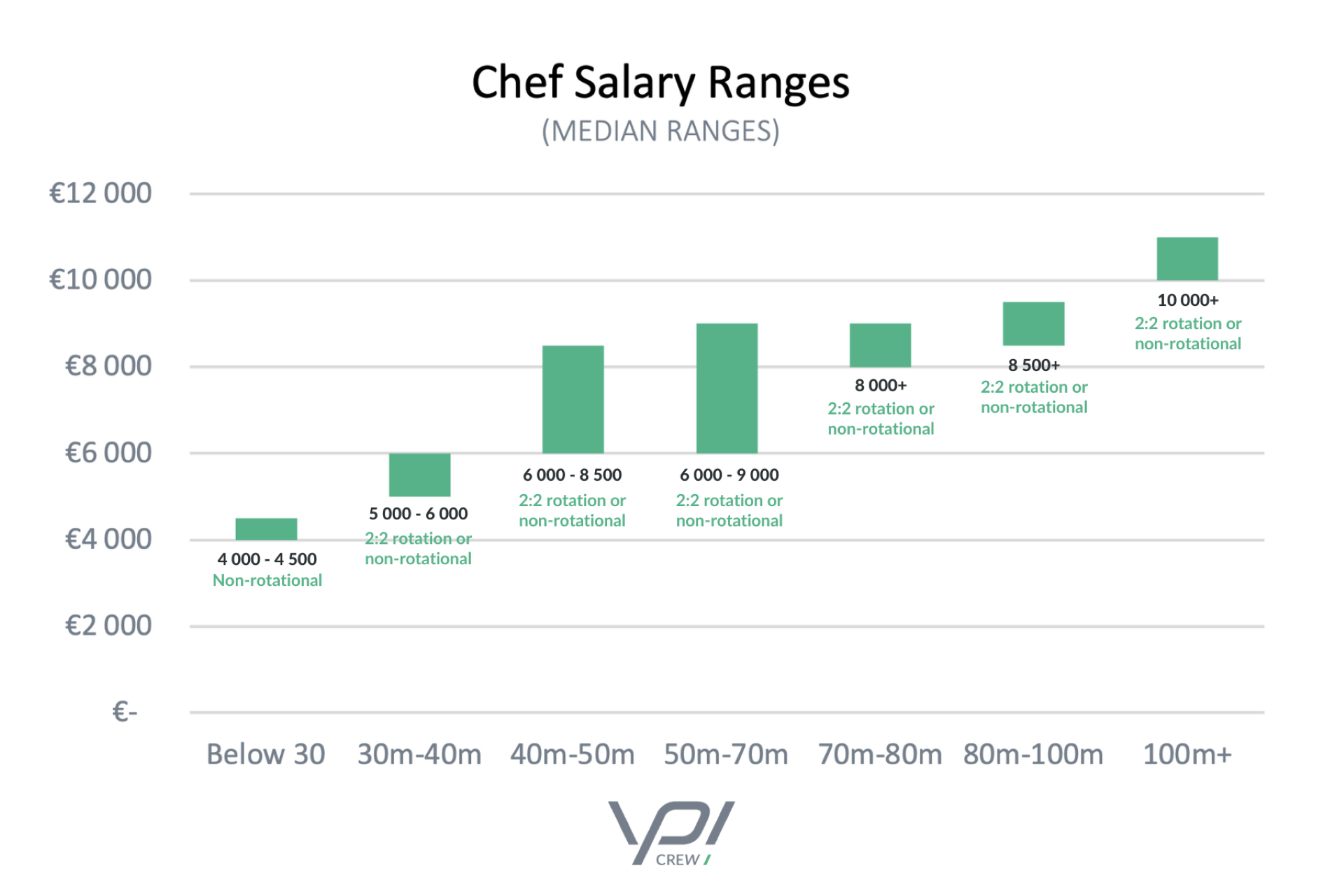
Additionally, and in order to compete with the larger yachts , an important number of yachts under 70metres are now also considering increased leave packages to secure top crew.
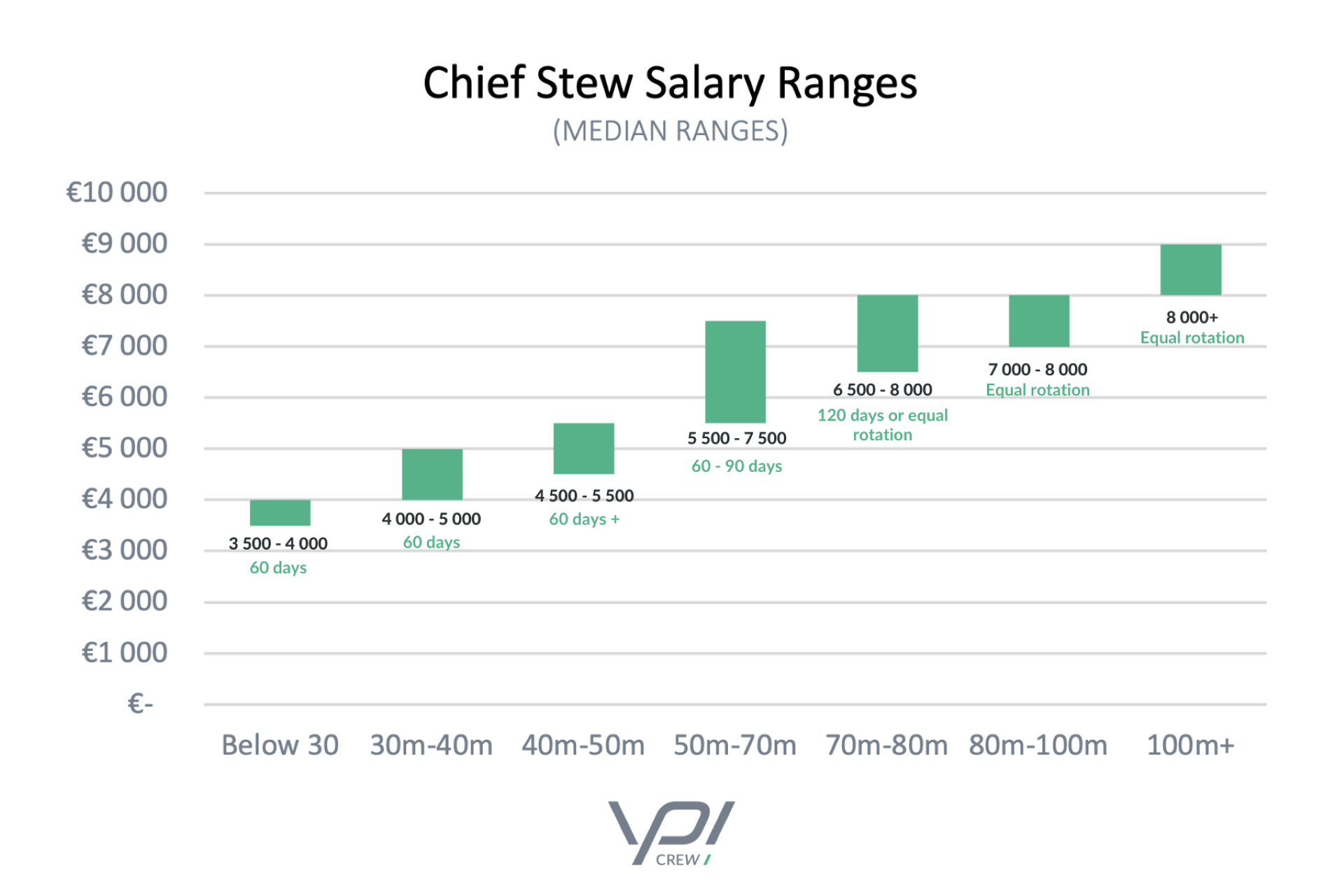
It’s important to note that the salaries listed in the report are median range salaries and can vary based on factors such as job-specific skills, professional qualifications, and experience.
For a full report visit YPI CREW website. https://www.ypicrew.com/yacht-crew-salary-guide
ABOUT YPI CREW:
Established in 2002, YPI CREW has been connecting people with their dream careers on board superyachts for over two decades. Our purpose is to allow new generations to discover yachting, whilst also helping seasoned crew to advance their career and develop their talents. Our recruiters are solution driven; they have a voice, an opinion, and champion their candidates for the right jobs on the best yachts. From our home in the yachting capital of Antibes on the French Côte d’Azur, we source and recruit the best yacht crew worldwide. Our recruitment experts connect the best talent, from deckhands to captains, engineers, chefs and interior crew with every yacht we work with. We build united, high-performing crew able to deliver the ultimate guest experience on board yachts all over the world and, simultaneously, allow the fostering of new life experiences. YPI CREW are proud to be part of the esteemed Schulte Group, a global ship owning and management company with over 135 years of expertise in the commercial maritime industry.
Share this article:
- Related articles
- popular articles

Splendid Yachting Goes International
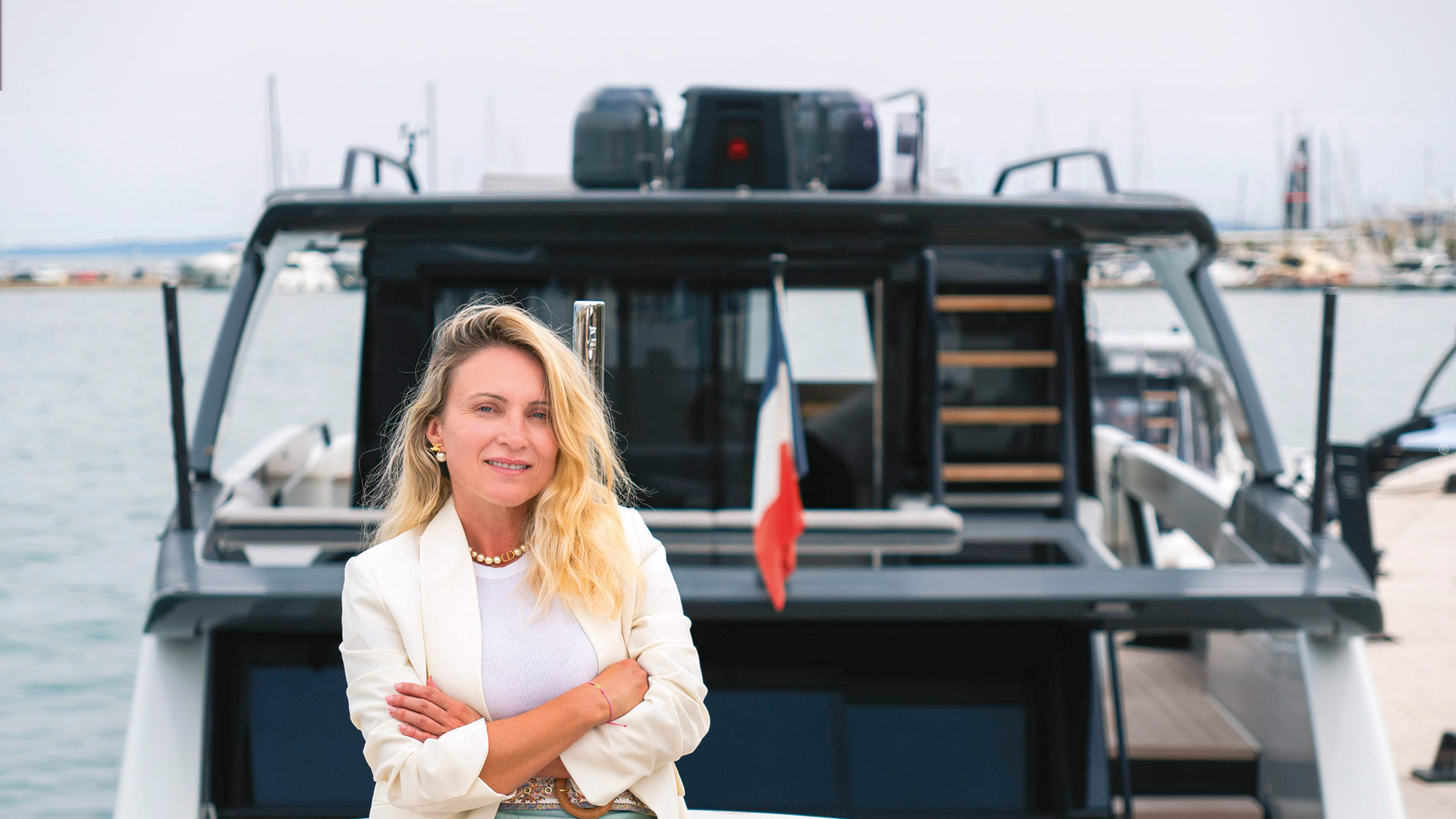
Sanja Božović: A New Sales Director of Sanlorenzo Adria

Maja Borovina Frankić: Driving Force Behind Masters of Building Fair

Andrija Šimić: True Ambassador of Croatian Yachting

U-Boat Worx unveils the all-new Super Sub
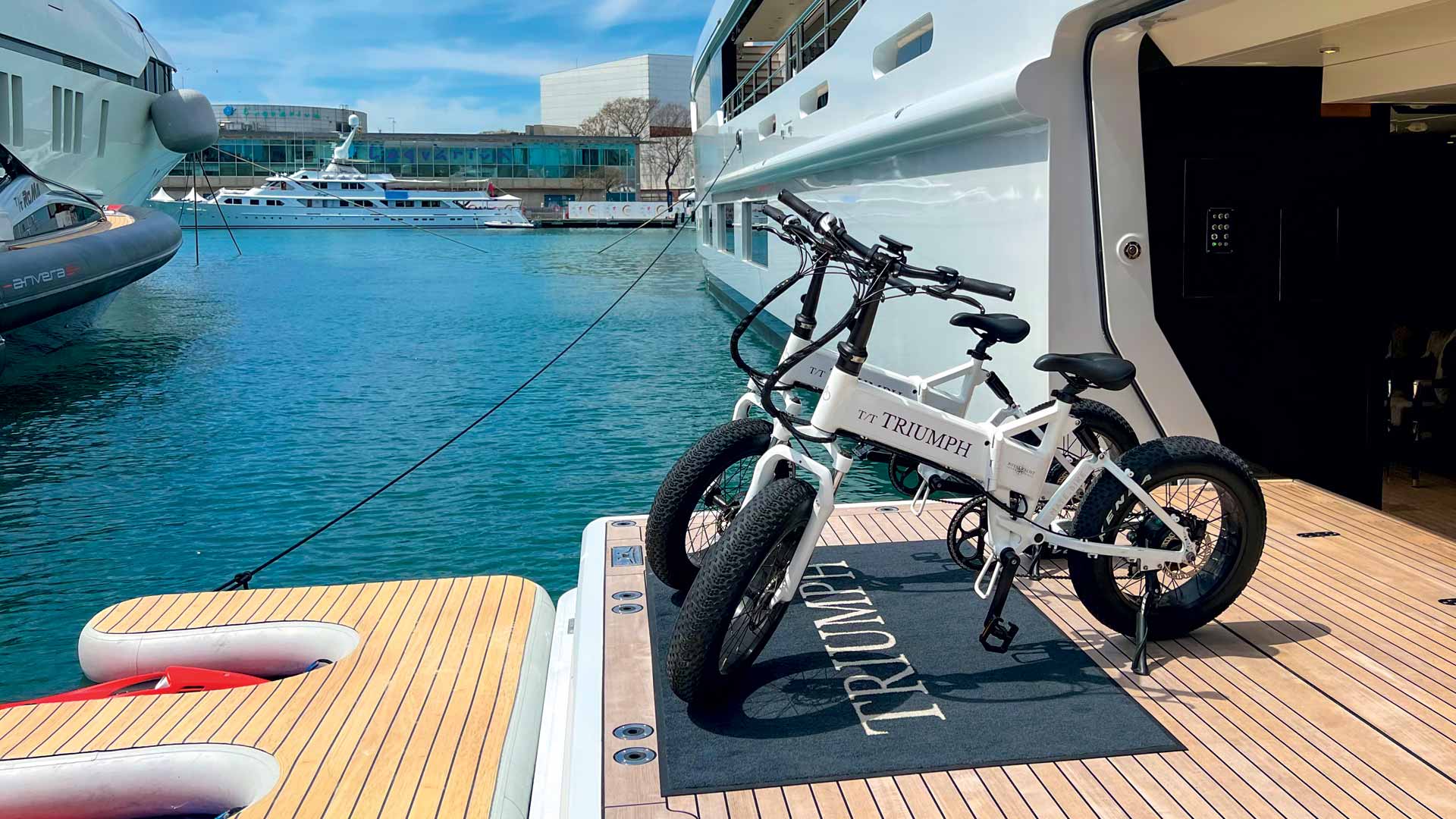
Boaters Love This Folding e-bikes And e-scooters

Swan Arrow: A 75 Foot Motoryacht From Nautor Swan

Luxury Tenders: The Joy of Ultimate Leisure

Free Newsletter
- Consent * I agree to the privacy policy.
yachts.croatia


- AMERICA'S CUP
- CLASSIFIEDS
- NEWSLETTERS
- SUBMIT NEWS

YPI Crew's 2022 salary report is out - See all the data about yacht crew earnings

Related Articles


Yacht Crew Salaries: The Current State
Posted October 12, 2023 by Ashleigh King
The topic of salaries in the yachting industry has gained attention this year, with a growing sense of awareness and discussion. Louisa had the opportunity to speak with several dedicated crew members who have shared their thoughts and concerns about this matter. With the ever-changing economic landscape, it’s crucial to assess whether salaries for yacht crew have adapted to these shifts in a positive direction.
A comprehensive analysis of Dockwalk’s salary surveys over the past several years reveals a rather consistent pattern spanning a 15-year period. Specifically, when comparing salaries in euros for a 50-meter yacht between 2008 and 2023, certain trends emerge. In the case of Captains, the industry average in 2008 ranged from 7,000 to 10,000 euros per month, while this year, it has extended from 7,000 to 15,000 euros per month. Similarly, Chief Engineers in 2008 were earning an average of 5,000 to 7,000 euros per month, whereas in 2023, their earnings range from 5,000 to 10,000 euros per month. It is noteworthy that while the lower-end salaries have remained relatively consistent, the upper-end figures have witnessed a significant increase, aligning more closely with industry expectations.
While the top-end salaries can be attributed to experience and longevity, it remains pertinent to question why the baseline salaries have remained at their current level. This inquiry may stem from the various factors related to job availability and individual crew preferences. It’s possible that, after a period of uncertainty, many crew members are now placing a higher value on the stability of full-time positions over seeking higher pay.
Engaging with numerous crew members who express diverse expectations and requirements underscores the challenge of establishing industry standards, especially considering the growing prevalence of rotational contracts. A notable example illustrates this complexity: I recently met a Captain who was perplexed by the stark disparity in his salary compared to that of a colleague. However, one crucial aspect he overlooked was that his counterpart had been with the same owner for four additional years, underscoring the significance of longevity in this profession.
Furthermore, entry-level crew members are facing their own set of challenges. Green crew are currently being offered a monthly compensation of 2,000 euros, which is nearly the same from 15 years ago when it ranged from 2,000 to 2,500 euros.
While the average monthly compensation for green crew hasn’t seen substantial growth over the past 15 years, it’s essential to acknowledge the rising costs associated with crew housing, food, and travel. In this light, exploring creative solutions to improve the financial well-being of entry-level crew members is a valuable consideration.
While the topic of salary stagnation in the yachting industry has raised concerns, there is also a silver lining. Salaries for experienced crew members have been on an upward trajectory, and the industry is evolving to accommodate different needs and preferences. By focusing on the positive aspects of these changes, we can look forward to a brighter future for all members of the yacht crew community.
Download our Crew Salary Guideline PDFs in Dollars and Euros for more helpful information.
With our presence established in the key yachting hubs worldwide, we stand ready to address all your crew-related requirements. Don’t hesitate to reach out and schedule a consultation with one of our dedicated N&J Crew team members today!

Proud to be part of the MarineMax family
© 2024 Northrop & Johnson
- Yachting for beginners
- Owning a yacht
- Motor Yachts
- Sailing Yacht
- Indian Ocean
- Mediterranean
- Buying or Selling a Yacht
- Yachting Events
- FAQ – Luxury Yacht Charter
- FAQ – Buying a Yacht
- FAQ – Sell your Yacht
- How Much Does It Cost To Charter A Luxury Yacht?
- All our Blog Post & News

Yacht crew positions : Hierarchy, Missions & Salaries explained
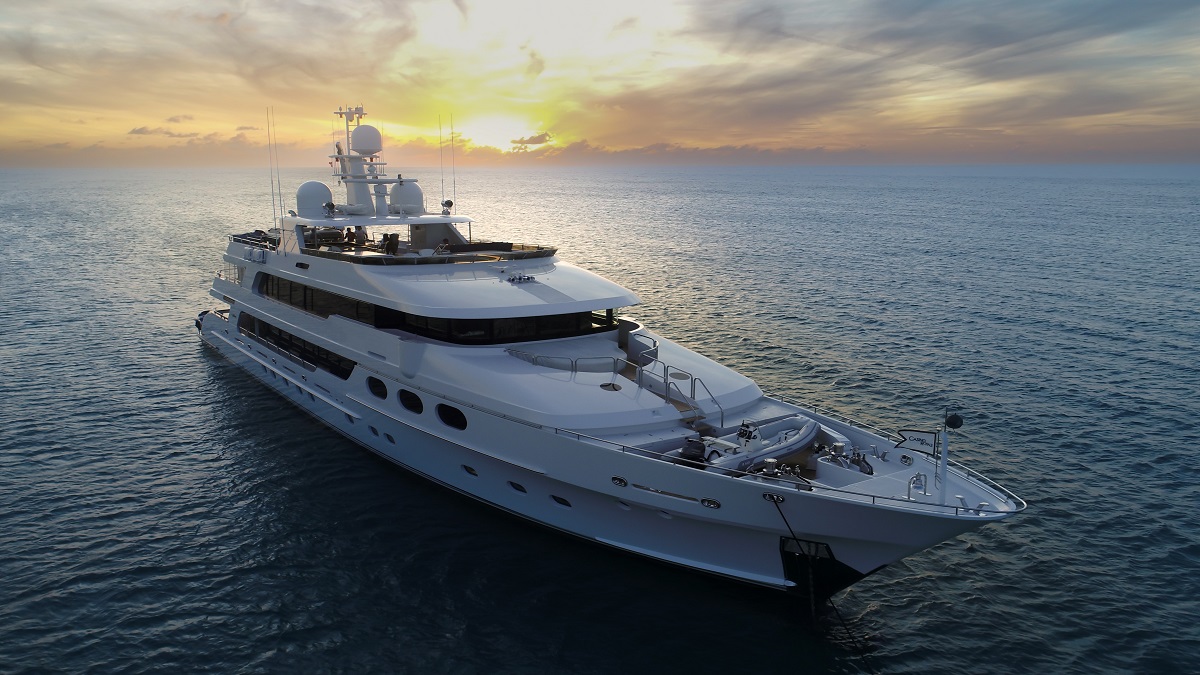
Like any well-run hotel, restaurant, or other luxury service, a crewed yacht needs organized structure and good management. Whether you’re staffing your own luxury vessel or looking for an exciting career working and traveling the world, you need to know how this structure works, and what you can expect to pay or earn and do in the various roles on board.
Every yacht is a little different, and organization may reflect the style of the captain or the demands of the owner. But the same jobs need to be done on almost every boat. Organized with ranks, heads of each division report to the Captain. It’s not a military-style organization, but there are parallels with merchant marine grades and structures.
Smaller yachts need fewer crew, and staff may wear multiple hats that cross more traditional divisions and may combine some jobs with others. Large yachts have more distinct divisions or subdivisions, with more specialization to divide tasks and manage staffing. The core skills are the same, but finding staff with the right blends to do the jobs is key. Crew with broader skills are highly sought after.
As a yacht owner, you shouldn’t have to worry about day-to-day management decisions or organizing all this. That’s why you have a captain, and it’s better to leave staffing decisions entirely up to him or her. But it’s still important to know what it is people you’re hiring do, why they’re there, and how many you need. You don’t want too many crew, or to be short-handed. An understanding of what your yacht needs helps you talk to the captain to keep your yacht running how you want it.
For those looking to break into yacht crew work, consider your skills and strengths, and what jobs appeal to you. You’ll need training before you work, and you can direct your job path through the training you seek. Your goal is a suitable position on a well-run yacht, so make yourself the most attractive candidate possible.
Yacht Work Life
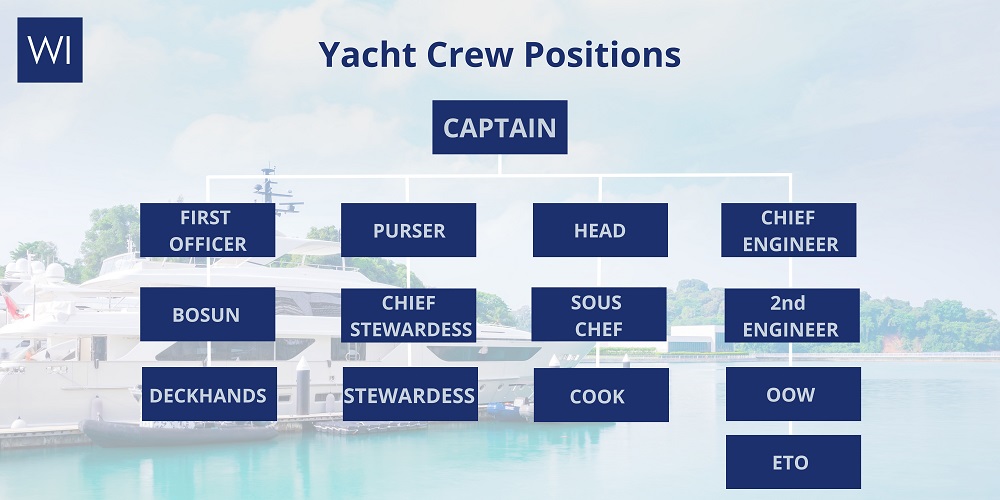
Working on a yacht is also living on the yacht. Crew must have a space to sleep, food, and all the basics that any employee needs. Large yachts have space reserved for crew, and owners looking for quality crew should provide good working and living conditions. Your crew takes care of you, and you should take care of them.
Depending on where a yacht operates or what flag she flies, a variety of labor laws or rules may be in effect. These requirements may be for work visas, contracts and written agreements, and compliance with merchant and ship crew treaties and laws. Be prepared to have work and non-disclosure agreements between yacht and crew, though a few yachts skip this.
Seasonal Jobs
Many yacht positions are seasonal. Year-round employment is more likely for senior crew like the captain and department heads, but not all yachts see year-round use. And some yachts may use different crew in different locales between seasonal moves.
Any job listing should give seasonal information, with geographic information, the length of the season, and the prospects for year-round positions and repeat employment.
Hours, Salaries, and Expectations
Yacht crew is a service job at its core, and every yacht owner is looking for service-oriented people who understand how to deliver a hotel-quality living and restaurant-quality fine dining. Work experience in luxury hotels and restaurants is a big plus for some jobs, and makes breaking into yacht work easier.
Yacht work can be very demanding, with periods of intense work when the owner and guests or a charter party is on board. Long days aren’t uncommon, but often balance with slack time when the boat is empty of passengers. There is always work to be done, but there’s usually a chance for time off.
Most salaries are monthly, since many positions are seasonal. Pay ranges are commensurate with experience, rank, and responsibility. Private vessels usually offer higher base pay, as charter crew can earn tips on top of their base salary. Because of the demands of the lifestyle, compensation is good and you have minimal living expenses on board.
Benefits and Time Off
Because so many jobs are seasonal and may occur in different countries and locations, benefits offered to yacht crew vary widely. But it is not uncommon for crew to be offered health and accident insurance and a flight to the vessel. Living on board, you’ll get food, rooming (usually shared), basic toiletries, uniforms, and laundry. Yachts with a longer view may offer additional training to long-term prospects.
Time off is usually linked to boat use, and may be sporadic in-season or when the boat has the owner and guests on board. There will always be some time off, but it may be between very intense work periods.
Most crew jobs have an employment contract that meets the Maritime Labour Convention 2006 (MLC). This should spell out the contract period and duration, as well as salary, leave and time off, probationary periods, repatriation policies, and any other crucial details to meet the minimum international standards of crew welfare.
This contract should also contain shipboard policies on confidentiality and non-disclosures, drug and alcohol use on board, personal hygiene expectations, interpersonal relationships, and dispute resolution. Job expectations and requirements can also be included, with specific language about roles, tasks, and cooperation between divisions.
Note that all crew agreements will explicitly prohibit drug use on board, most limit alcohol consumption and ban hard liquor on board, and many boats have policies prohibiting intimate personal crew relationships. Because the crew is living on board full time and in close quarters, rules to maintain decorum and crew harmony may be in writing.
Training & Certificates
Two key certifications are required for yacht crew. Employers look for the STCW (Standards of Training, Certification and Watch-keeping for Seafarers) and the ENG1 (Seafarer Medical Certificate). Insurers generally require crew to have these two certifications or the equivalent.
The ENG1 isn’t a class. It’s a medical exam to ensure that the crew is physically fit to serve at sea and has no underlying conditions that may arise far from help. It’s best for prospective crew to secure the ENG1 before investing more time and money training.
STCW is a week-long class on the basics of onboard safety. This includes hands-on modules covering personal survival, fire safety, first aid and CPR, accident prevention, and security awareness. It needs to be refreshed every five years.
Shared, Hybrid, and Crossover Jobs
Larger vessels will have more defined duties and specific areas of responsibility. But smaller yachts may want the crew to have different roles in different situations. For example, a hybrid job description may read “3rd Engineer/Steward” and describe a role in engineering when the boat is empty but on inside crew when passengers are on board.
When hiring or seeking jobs be prepared to look for creative crossover skill sets to meet the needs of the vessel.
Extra Skills and Duties
Any extra skills outside the regular duties makes crew more attractive. From stewards who can teach yoga, give massages or play cocktail piano to deck crew who know how to water ski, SCUBA dive, or fish, anything that crew can bring to enhance the passenger experience adds value to the employee.
If you’re looking for a position, list the skills you’d be comfortable using. If a vessel owner is looking for something specific, spell it out and figure out how that special duty fits into the employee work day.
The Four Main Divisions

Most yacht crews break into four primary divisions which group related tasks and responsibilities together. While the grouping sounds like it’s by section of the boat, they’re really more functional. For example, stewards (Interior) will definitely serve meals, whether they’re in the main dining room or out on deck. Deckhands (deck) are going to be involved in painting, sanding, and varnish jobs anywhere on the boat.
The deck crew handles most of the exterior operations of the yacht, and runs it. Deck hands and crew keep the boat looking clean and shiny, and handling most vessel operations. This includes driving and operating the yacht, navigation, running all launches and ship’s craft, handling lines, and all maintenance and painting, washing, and shining.
2-Interior (or Inside)
Inside crew are primarily the stewards and housekeepers. Larger vessels will have a dedicated housekeeping staff separate from the stewards, but smaller vessels may not.
Stewards keep the interior clean, do all housekeeping, laundry, food and beverage service, cabin preparation, and anything else needed for the comfort of the passengers.
3-Engineering
Below decks, the engineering department ensures the safe and smooth running of all the ship’s machinery and electronics. Engineers are engine and systems specialists, and there will usually be a dedicated electronics expert. Most engineer jobs require professional training and certification.
Fine dining is a hallmark of the yachting experience, and a full-time galley crew prepares all meals for passengers and crew. The head chef plans the menus and provisions the boat, while junior chefs assist the head chef with meal preparation and keeping the galley spotless.
Yacht Job and Department Details

Departments are all organized in a hierarchy, with a department head reporting to the Captain. The clear chain of command makes for smooth operations, with all communications going up and down ranks. Junior staff will occasionally take instructions from other divisions as all crew is expected to help as needed. A captain or department head may organize staff differently, so reporting structures listed are guidelines only.
All salary ranges are monthly figures and are ranges based on yacht size and crew experience. Senior jobs on larger yachts have more responsibility than the same job title on yachts with smaller crews. Experienced crew are very desirable and can expect more pay for their positions.
Listed responsibilities are not exhaustive, and different yachts may allocate some jobs to different positions.
Read also: The yacht charter experience ladder
The Captain

The captain of the vessel is the overall decision maker for the yacht in all situations, including the safety of the vessel. The owner should leave the Captain responsible for operational decisions about hiring and staff and operating the ship. To become a captain requires years of experience and training, and a broad set of skills including yacht operations, personnel management, budgeting and finance. The captain works directly with the owner and owner’s representative, if the captain is not also acting as the representative.
On an organization chart, the Captain is usually placed in the deck division, but the Captain is always the senior-most crew on the yacht and all division heads report to the Captain.
Responsibilities include:
- Responsible for all navigation and running the yacht.
- Senior decision maker on all crew hiring.
- Manage repairs, refits, and yard work.
- Manage budgets and accounting. On larger yachts, this task ends more on the Purser, but the captain is always responsible.
- Ensure all paperwork, clearances, and legal requirements are completed.
- Primary contact with the owner or charter parties.
Reports to: The yacht owner
Salary Range: $6,000 to $22,000
The deckhands handle all the outside responsibilities of the ship, including cleaning and maintenance of the yacht and all the ship’s vessels and toys on board. Deck crew will have significant contact with passengers in this role, operating launches and delivering guests to and from shore and handling the toys.
All deck crew have watch responsibilities on passage, and daily responsibilities keeping the yacht pristine and clean. They will also do line handling and secure the yacht.
Deck department : Chief Mate/First Officer
The Chief Mate or First Officer is the second in command of the vessel, and left in charge when the Captain is not on board. The first mate has the requisite skills to stand in for the captain and run the yacht if needed and usually acts as the division head of the deck team.
The seamanship skills needed are similar to the Captain’s position.
- Primary safety officer for the yacht and all passengers and crew.
- Supervise and manage all operations on deck.
- Bridge watches on passage.
- Passage planning and navigation.
There may be additional mates on larger vessels, these 2nd, 3rd, etc. mates have similar responsibilities on rotation. But the first mate is senior and always second in command.
Reports to: Captain
Salary Range: $4,000 to $9,500 (First mate)
Second and more junior mates may earn $2,000 to $4,000

Deck department : Bosun

The Bosun is the senior deckhand and manages the junior hands on board. This will usually be the most experienced hand on board.
- Organizing all operations on deck.
- Coordinating the use, storing and launching of the ship’s boats, toys, and equipment.
- Managing the passerelle, watching passenger safety.
- Contact point for guest service on boats, toys, and trips to shore.
Reports to: First mate
Salary Range: $3,000 to $5,000
Deck department : Deckhands
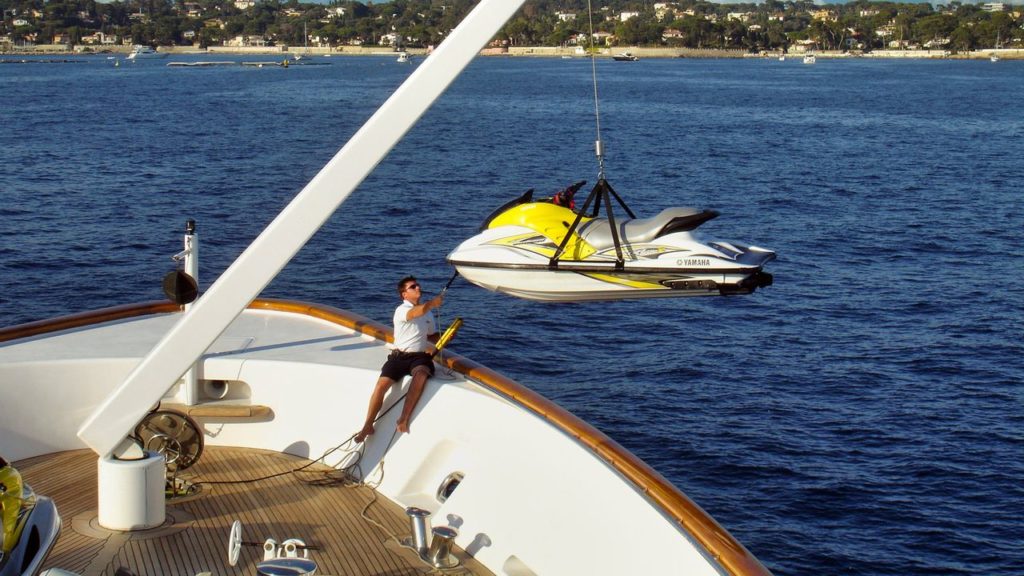
Deckhands are constantly busy with maintenance, cleaning, polishing, and assisting guests as needed. They will assist other departments as needed or given special duties.
- Daily cleaning of the yacht’s exterior.
- Painting, varnishing, polishing.
- Line handling.
- Launching and operating dinghies and tenders.
- Repairs and carpentry.
- Helping guests as needed – everything from handling baggage and gear to embarking and disembarking.
Reports to: Bosun
Salary range: $1,300 to $3,000
Though every position on a yacht is service-oriented, the interior or inside crew provides the primary customer service. They will interact the most with the passengers daily, and they’re directly responsible for the quality of their experience on board.
Interior department : the Purser
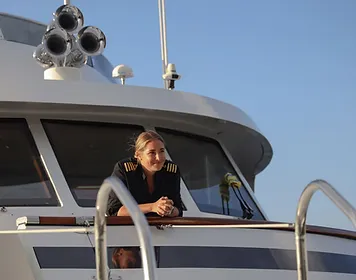
The purser is the chief financial officer of the yacht and handles all the financial operations on board. Accounting, purchasing, payroll and hiring, and all money matters end up with the Purser. This is a senior staff position, and may be the interior department head. Smaller yachts may eliminate the purser’s job and add it to the captain’s and other senior staff duties.
Responsibilities Include:
- Accounting and bookkeeping for all financial transactions.
- Human resources and payroll.
- Handling logistics for all departments related to purchasing.
- Managing contracts.
- Event coordination, including off yacht bookings and payments.
- Primary administration of the boat’s business paperwork.
- Inventory and supply management.
Salary Range: $4,000 to $8,000
Interior department : The Chief Steward/ess

The chief steward or stewardess has primary responsibility for all service roles inside. Food and drink service, cabin preparation, and anything to do with helping the passengers be more comfortable and enjoy their stay. The chief steward will be inside crew with several years of experience.
The chief steward manages the interior staff, setting and enforcing vessel service standards. The chief steward ensures the crew delivers a five-star hospitality experience.
Chief Steward Responsibilities:
- Scheduling and training junior crew for meal and drink service and cabin preparation.
- Primary contact with guests for meals and drinks.
- Sommelier and wine service.
- Coordinate with the galley for meals and presentation.
- Decorate the interior, from flower arrangement to table settings.
- Arrange onshore activities and outings.
Reports to: Captain or Purser, depending on the yacht
Salary Range: $4,000 to $8,500
Stewards/Stewardesses
The stewards and stewardesses are the primary guest service staff. They will work closely with guests and passengers, and have daily contact with them as they meet most of their needs while on board.
Steward Responsibilities:
- Food and drink service.
- Room preparation and turndown service.
- Cleaning, polishing, housekeeping, and inside maintenance.
- Cabin detailing.
- Laundry, pressing, and folding.
- Help with outings, trips, debarkations.
Reports to: Chief Steward
Salary Range: $1,500 to $4,500
Housekeeping

Larger yachts may have a dedicated housekeeping and laundry staff. This will be part of the inside crew, under either the purser or the head steward. There may be a senior housekeeper, if there are more than one housekeeping crew on board.
Responsibilities are the cleaning and laundry portions of the steward’s job, and a laundry steward may spend most of her time inside the ship’s laundry.
An experienced Head of Housekeeping may earn from $4,500 to $7,000, while a Laundry Steward typically earns from $2,500 to $3,500.
Read also: CAN OWNING A YACHT TO CHARTER (REALLY) BE PROFITABLE?
Food service requirements on any yacht are high. Whether it’s a privately owned vessel or a charter, the expectations are always for top tier food service, with a variety of meals planned for the requirements of every passenger. Chefs and cooks prepare all meals on board for passengers and crew, but sometimes other interior crew may help with prep work or cleanup.
Smaller yachts have smaller galley crews, but the largest vessels may have an executive chef and several sous chefs. All chef positions require formal culinary training and experience, but cook positions are often entry level. Promotion from cook to chef is unusual without additional training.
Galley department : the Head / Executive Chef

On larger yachts, an Executive Chef will run the entire galley with the help of sous chefs and cooks. With an Executive Chef, there’s an expectation that the food and menus will be on a level with Michelin star-rated restaurants.
The executive chef brings a thorough understanding of food preparation and presentation, and moves food preparation past creative up to artistic. Job responsibilities are similar to a chef, but the job demands and the required experience and education are much higher.
Salary range: $7,000 to $11,000

The chef has overall responsibility for all meals on the yacht, from provisioning in remote places to hygiene and good safety. If there’s only one chef, she’s the head of the galley crew. Finding the best provisions in far away locations and making the best of local food availability is a major part of the job.
- Planning a delicious and varied menu for passengers.
- Sourcing all food and arranging transport to the yacht.
- Maintaining and operating within the galley budget.
- Preparing passenger meals with professional presentation and style.
- Cleaning and maintaining galley and galley equipment.
- Deliver menus and meals on time, while running an organized and spotless galley.
Galley department : Sous Chef
The sous chefs assist the chef in all aspects of running the galley, and may have independent assignments to plan and guest and crew meals. While not primarily responsible for provisioning, the sous chef will help with food selection, menu preparation, and planning. A sous chef must have formal culinary training.
Reports to: Head chef
Salary Range: $3,500 – $6,000.

Galley department : The Cook
Cooks may be entry-level positions or experienced, but do not require formal gastronomy education. They will assist the chef and sous chefs, cooking meals and dishes for guests and crew, helping with provisioning, and keeping the galley neat.
- Assist with provisioning and buying high-quality food from local sources.
- Follow all food handling and safety guidelines.
- Assist the head chef as needed, taking direction and guidance.
- Prepare guest and crew meals as required.
- Staying on top of galley inventories and supplies.
Salary Range: $2,500 to $3,500
Engineering

The engineering department keeps the yacht and all its systems working. Whether it’s the engines, electronics, air conditioning, or the plumbing – it’s up to engineering to keep it running.
There is considerable overlap with commercial shipping in the engineering field, as many of the same skills apply. And there is a broader range of qualifications and grades based on the size and power of the vessel. Job ratings may be set by required experience based on tonnage of ship or power of engines, with corresponding levels of pay and responsibility.
Unlike commercial shipping, engineers may get involved in other aspects of running the yacht, like helping with docking and water sports with mechanical toys.
Engineering certifications, training, ratings, experience and licensing are critical to hiring competent engineers, and for engineering crew it’s an important facet of career advancement. This is important for Chief and 2nd Engineers, which are often broken out by MCA (U.K. Maritime and Coastguard Agency) rating or other international equivalent.
MCA ratings for engineers Commercial and Private Yachts over 24m are:
Y4: Less than 200 Gross Tons and less than 1,500 kW engine power Y3: Less than 500 GT and 3,000 kW Y2: Less than 3,000 GT and 3,000 kW Y1: Less than 3,000 GT and 9,000 kW
There is also an unlimited rating for merchant vessels larger than the Y1 category. For discussing salary and responsibilities, we will include all ratings in one position description, but pay scales with the size of the yacht and any required higher ratings.
Chief Engineer
The chief engineer manages all aspects of keeping the yacht and its systems running. The chief engineer manages all the engineering staff, and directs all maintenance, repairs, troubleshooting and upgrades. This is a management position, but requires extensive hands-on technical experience and knowledge. Chief engineers on large yachts hold an MCA Y1 or Y2, smaller boats will have a lower rated chief and a smaller staff. Check Jooble.org to find abroad marine engineer vacancies.
- Provisioning, shopping, and stocking.
- Preparing passenger and crew meals.
- Following instructions and cooking under the direction of others.
- Galley cleaning.
- Follow food safety and storage procedures.
- Food pre-preparation.
Salary Range: $6,000 to $15,000
2nd Engineer
The second engineer is also a highly skilled position requiring a rating or license and several years of experience. This senior level engineer also needs knowledge of how to troubleshoot and maintain all yacht systems.
- Maintain and manage all engineering operations.
- Hire, train and supervise all engineers.
- Project manage all upgrades and retrofits, including managing budgets, contracts, and suppliers.
- Coordinate maintenance schedule for the entire yacht around the usage and seasonal schedules.
- Maintain costs and accounting for engineering operations.
- Design and handle all safety operations.
- Set and maintain standards for operations and cleanliness in the engine room.
Reports to: Chief engineer
Salary Range: $5,500 – $10,000
OOW (Officer of the Watch) Engineer
The OOW is a junior engineering position, but still licensed. There are two categories of OOW – MEOL (Marine Engine Operator License) and the more junior AEC (Assistant Engine Course). The overall responsibilities are similar, working to support the senior engineers and handle independent assignments. The AEC rating is entry level for licensed crew, but has training and certification.
- Support the chief in all projects.
- Maintain a clean, safe engine room.
- Perform all maintenance, troubleshooting and repair tasks as needed.
- Support motorized water sports.
- Occasionally assist with other vessel operations, like line handling.
Reports to: Chief Engineer
Salary Range, MEOL: $4,500 to $6,000 Salary Range, AEC: $2,500 to $3,500
Electronics/Technology Officer (ETO)
The ETO takes responsibility for all audio-visual and information technology on board. Ensuring passengers have access to the internet, movies, television, and music is a primary responsibility. This position carries a fair amount of passenger interaction, and an ETO needs good troubleshooting skills to go with customer service skills.
- Ensure all audio/visual and entertainment systems are always available for passengers.
- Assist passengers with personal technology and ship systems as needed.
- Conduct regular maintenance and upgrades of the network, information, and A/V systems around passenger schedules.
- Assist other engineers as needed, especially with electronic systems.
- Contribute as needed with other departments for boat and passenger operations.
Salary Range: $4,000 to $9,000
Junior Engineer
This is a lower or entry level position for someone with engineering skills but without formal licensing or certification. The junior engineer will help with safety and cleanliness, and assist in any engineering tasks as needed. The ability to solve problems and fix things opens this spot for anyone capable and willing to do the job.
- Help with cleaning, maintenance, and safety functions.
- Help anywhere needed on the yacht.
- Assist senior engineers as needed, taking direction and following instructions exactly.
- Constantly develop skills.
Read also: IS BUYING A BOAT A BAD IDEA?
Whether you are a yacht owner or considering entering this dynamic industry with an established and reliable crew, it is essential to have an understanding of the yacht’s hierarchical structure, mission priorities, and salary expectations. By doing your research on the complexity of yachting before hiring your team, you can confidently select the right group of experienced and qualified professionals for your needs. Staying up-to-date on top industry trends and knowing the capabilities of each type of yacht crew position will enable you to make sound decisions that support a safe and cost-effective journey. With quality personnel at your helm, you can cruise unhindered in luxury and explore new destinations with peace of mind.
Fractional Yacht Ownership : Everything you Need to Know
What is the best country to register your yacht offshore, you might also like.

Windward Yachts Launches WhatsApp Channel for Latest Updates

What differentiates a yacht from a superyacht or a mega yacht?

Chartering Requirements and Regulations: A Guide for Boat Owners
Superyacht Crew Salaries: First Report Released
- Inspiration
Related News
Popular news this week, popular news this month, latest news.
- Yacht Charter & Superyacht News >
Written by Maria Korotaeva
Many life-long careers in the yachting industry have begun as a seasonal job or gap year with a desire to visit exotic destinations. The continual change and challenges that come with each new charter group make the positive feedback even more satisfying and those with lifelong wanderlust have a rare opportunity to see some of the world’s most incredible cities and scenery .
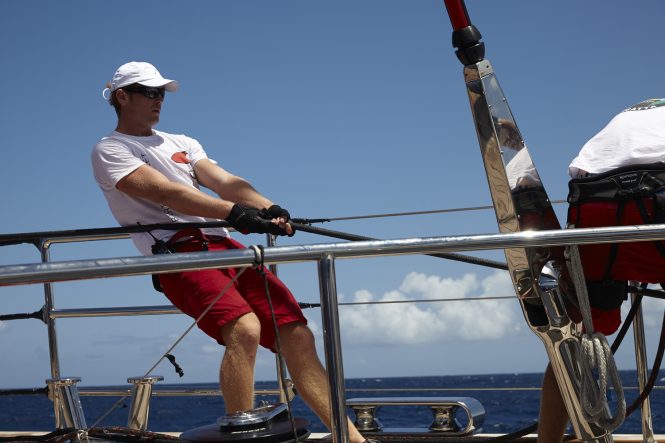
Seahwak’s Crew
Working on a luxury yacht isn’t without its drawbacks, however: Weeks at a time spent away from home, long working hours in the peak seasons and ensuring that everything runs smoothly when you’re far from the port can all take their toll. When performing tasks that can be as equally trying as they are rewarding, crew members want to assure that their pay reflects the professionalism and high degree of detail that they put into each day.
Following the launch of free salary-sharing platform www.yachtingsalaries.com in March 2016, YPI CREW has revealed its first report into the salaries paid to the crew on luxury yachts of various sizes.
Covering the period between 2016/2017, the results not only provide transparency to crew members but help employers to attract and retain individuals with exceptional skills. The occupations covered range from captains to deckhands and compare pay for permanent, private, rotation and charter crew: Find out how the charter industry measures up to the other sectors.
446 captains submitted information to www.yachtingsalaries.com, and the data revealed that 13% worked on sailing yachts and the other 83% on motor yachts. Captains on larger yachts earned more per month than captains of smaller vessels to create an upward trend, although M/Y captains of 35m-51m superyachts fared particularly well, with a jump in salary from €9,000 per month for 41m-50m yachts up to €13,000 p/m for larger luxury yachts. Private and permanent captains tended to earn the most for their size category, with permanent captains coming out slightly ahead.
Sailing yacht captains tended to earn the same as on motor yachts for the 0-35m and 35-40m vessels, earned more than motor yacht captains in the 41-50m category by €2,000 per month, and earned less than motor yacht captains by €2,000 in the 51-65m category.
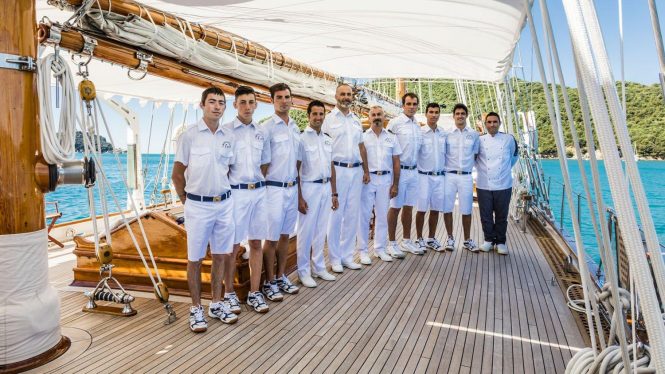
Crew aboard Crose Del Sud
Technical Crew
239 of the 434 technical crew surveyed were chief engineers, and on charter yachts, they earned an excellent salary compared to private, permanent and rotational counterparts on the same-sized yacht: In the 0-35m size category, they earned €6,000 per month compared to €5,500. Salary levelled off in the 80-100m category, with chief engineers on charters earning slightly less than others with a salary of €9,500.
Second engineers were the most stable across the sectors and received a steady pay of between €48,000, rising to €70,000 on the largest yachts. Second engineers on charter yachts were paid considerably more per month than permanent and private second engineers within the 51-65m and 66-80m categories, earning between €5,000-€10,000 more in the former category and €2,000-€5,000 per month more in the latter.
Third engineers earned between €2,500 and €5,000 per month, with the pay scale raising incrementally based on yacht size.
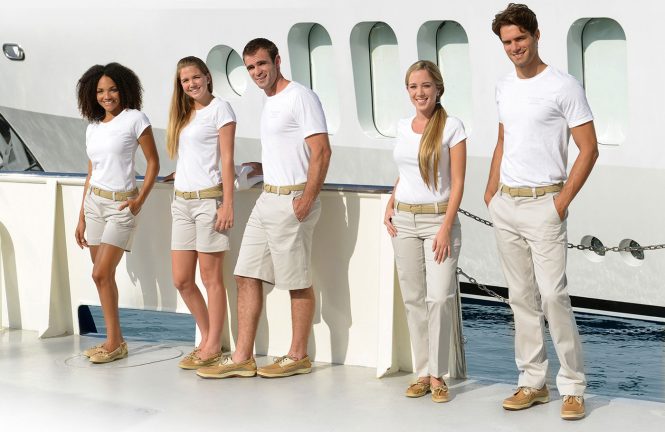
Luxury superyacht crew
Deck officers
69% of the 224 deck officers who took part in the survey were permanent and 31% rotational. Second and third officers had a greater chance of occupying a rotational position (50% and 70%), making deck officers the most likely crew members to have rotational work. Deck officers on charter yachts tended to earn less than counterparts on similarly-sized vessels, and private and permanent positions provide the most stable throughout.
Salaries for chief officers on charter yachts ranged from under €4,000 per month on 0-35m vessels to over €8,000 on 81-100m vessels and dropping slightly in the category of 101+m
Data for 2nd and 3rd officers was more sporadic, and charter position salaries ranged from €3,800 for both positions on yachts 51-65m and upwards.
Although 127 chefs participated in the survey, results were varied both for yacht sizes and sectors, producing the unusual graph where the head chefs on a 0-35m and 66-80m yacht were earning approximately the same (€4,000 per month) while on other sized charter yachts the head chefs were earning between €5,000 and €8,000. Of the head chefs who submitted data. 85% were permanent and 15% on rotation.

Dining aboard superyacht SuRi
Vessel size seemed to play a part in the salary of sous chefs, with each type of employees earning more on larger yachts. 71% were permanent, and 29% were temporary.
Pursers, Stewards and Stewardesses
For the 2016/2017 report, only 27 pursers, 68 chief stewards/stewardesses and 27-second stewards/stewardesses provided information, and there are therefore too few results to make solid conclusions about industry salaries in this area. Of the pursers, salary varies from €5,000 per month to €7,000 and remuneration did not have any correlation with the size of the yacht and salary was stable regardless of the type of employment, although results were the most unstable in the 66-80m category.
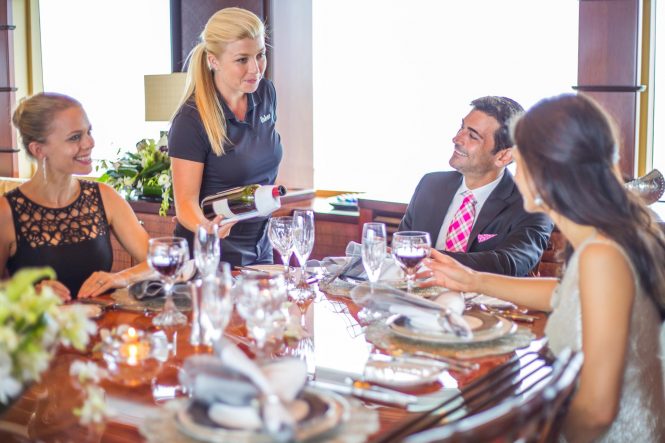
Excellent service onboard
Chief stewards and stewardesses received greater salaries for working on larger yachts, with rotation, permanent and private employment having the most stable salaries and charter crew the most variable: salary on a 51-65m superyacht was €6,500 per month, whereas under €6,000 was paid to stewards and stewardesses aboard 66-80m vessels and smaller yachts.
The results of the second stewards and stewardesses had the most variability, with charter and rotation crew earning under €3,000 for 66-80m vessels while private and permanent crew earned €5,000.
Deckhands
Deckhand salaries tended not to vary depending on the size of the vessel, and 93% were permanent and 7% on rotation aboard motor yachts, while sailing yachts had 100%, permanent crew. From the 87 deckhands that contributed to the study, data revealed that salaries tended to range between €2,100 – €3,000 per month, regardless of whether the yacht was a charter, private or permanent. Deckhands on rotation earned €3,000-€9,000 less depending on the size of the yacht.
The website www.yachtingsalaries.com currently has 2,857 searchable salaries and includes other professions such as bosun and helicopter pilot, as well as the full comprehensive report. Results are searchable at any time, and the next report is due in November 2018.
Please contact CharterWorld - the luxury yacht charter specialist - for more on superyacht news item "Superyacht Crew Salaries: First Report Released ".
- Charity & Fund Raising
- CharterWorld News
- Classic Yachts
- Coronavirus
- Cruise Ship
- Ecological Yachts
- Expedition Yachts
- Expert Broker Advice
- Feature Superyachts
- Interior Design
- Legal & VAT Yacht Issues
- Luxury Catamarans
- Luxury Gulet
- Luxury Phinisi
- Luxury Trimarans
- Luxury Yacht Design
- Luxury Yachts
- Marinas & Harbours
- Marine Ecology
- Marine Electronics
- Marine Equipment
- Mega Yachts
- Modern Yachts
- Motor Yachts
- New Launch Yachts
- New To Charter
- Open Style Sports Yachts
- Private Jets
- Sailing Yachts
- Social Media
- Sports Yachts
- Superyacht Crew
- Superyacht Photographers
- Superyacht Products & Supplies
- Superyacht Refits
- Superyacht Reviews
- Superyachts
- Uncategorized
- Yacht Builders
- Yacht Charter
- Yacht Charter Destinations
- Yacht Charter Picks
- Yacht Charter Specials
- Yacht Delivered to Owner
- Yacht Designers
- Yacht Events & Boat Shows
- Yacht Fashion
- Yacht Industry News
- Yacht Photos
- Yacht Racing
- Yacht Racing & Regattas
- Yacht Safety Equipment
- Yacht Support Vessels
- Yacht Tenders
- Yacht Videos
- Yachting Associations
- Yachting Awards
- Yachting Business
- Yachts For Charter
- Yachts For Sale
Quick Enquiry
Superyacht news:.
Email Your Yachting News to: news @ charterworld.com

Viking Recruitment expands and moves office
The 2010 Genoa Charter Yacht Show Starts Tomorrow and Features Superyacht ICON 62, TRIDENT, BISTANGO and CLOUD NINE
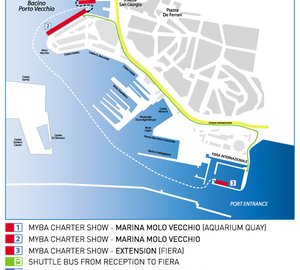
2011 MYBA Genoa Yacht Charter Show expands with extra dockage

Inaugural Superyacht Captains Forum in Auckland a success – Superyacht Captains enjoy Pacific tour
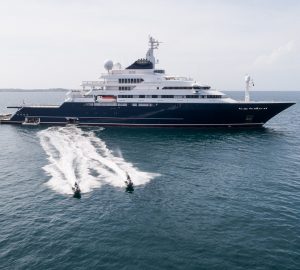
10 sensational superyachts with spectacular swimming pools

Superyacht KAŞIF on route to the 2024 Cannes and Monaco Yacht Shows

45m custom superyacht SAN will debut at the 2024 Monaco Yacht Show

Leapher Yachts unveils 49m luxury explorer yacht NAVIX50

Inaugural CROYA Charter Show announced for 4th to 6th October 2024 in Split, Croatia
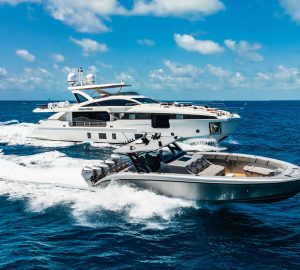
31m luxury yacht CARPE DIEM available for charter in the Bahamas

OCEA delivers 33m motor yacht ARAOK II to her new owner

39m sailing yacht LINNEA AURORA launched by SES Yachts

A luxury charter yacht is the perfect way to encounter New England’s fall foliage display

Charter yachts offering citizen science opportunities around the world
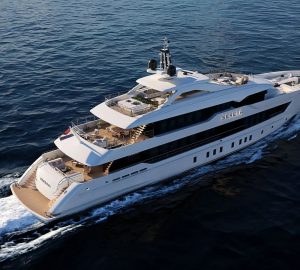
55m superyacht YN20555 is launched by Heesen Yachts and named superyacht SERENA

Late summer special offer on board 72m superyacht ARBEMA in the Western Mediterranean

37m luxury explorer yacht OCULUS brand new to the charter market on both sides of the Atlantic
Yacht Crew Salaries
Average starting salary guidelines.
The crew salaries reflected below have been derived from placement records and job orders for both power and sail, reflected as an average, received by Crewfinders within the past year and may change without notice.
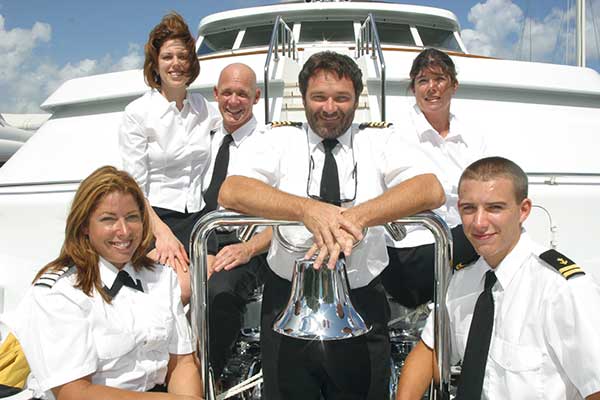

Crew Salary Survey
Read the latest report and analysis of current crew's salaries on Oyster Yachts - published March 2024
Sign up to our newsletter
Be the first to hear about new launches, exclusive events and all things Oyster
© 2024 OYSTER YACHTS

OYSTER WORLD RALLY
Entries for the Oyster World Rally 2028-29 are now open. Embark on the sailing adventure of a lifetime

The new 565 Series II
The pursuit of perfection continues

Oyster Charter
Experience exhilarating sailing, luxury and style on an Oyster charter

New 565 Series II

LUXURY CHARTER
Experience exhilarating sailing, luxury and style on an oyster charter. personal, exclusive and uniquely oyster.

Oyster 825 iSNL
Discover this exceptional late model 825 with a unbeatable spec and a bespoke layout.

oyster ownership
Personalised care, unforgettable experiences and lifelong yacht support, oyster world rally.

ENTRIES OPEN
Embark on the sailing adventure of a lifetime. entries are now open for the oyster world rally 2028-29.

Follow the Oyster World Rally 2024-25 fleet live
Winner of European Yacht of the Year 2023. She is a new breed of luxury 50 foot yacht, offering effortless shorthanded sailing capability.

A magnificent, award-winning sub 60 foot sailing yacht, offering luxurious living space and outstanding shorthanded sailing capability.

A beautifully proportioned 60 foot, luxury liveaboard bluewater cruiser, offering effortless shorthanded sailing capability.

A superb sub 70 foot ocean sailboat offering versatile luxury living space and impeccable sailing performance.

An inspired 75 foot yacht, offering infinite configuration options, generous luxury living space and flexible crew quarters.

Oyster 885SII
The remarkable, iconic 90 foot sailboat, perfect for relaxed luxury voyages of discovery.

First name *
Last name *
Phone number *
Country/Region *
Attach CV *
Attach covering letter
Current occupation
LinkedIn profile
- Brokerage New Construction How to Buy How to Sell
- Yacht Fleet Yacht Catalog Charter Marketing Destination Guides
- Financial Services Payroll & Accounting Payroll Service Process Logistical Support Admin Services Crew Admin
- Job Descriptions Crew FAQ
- About Sitemap
How Much Does a Yacht Captain Make?
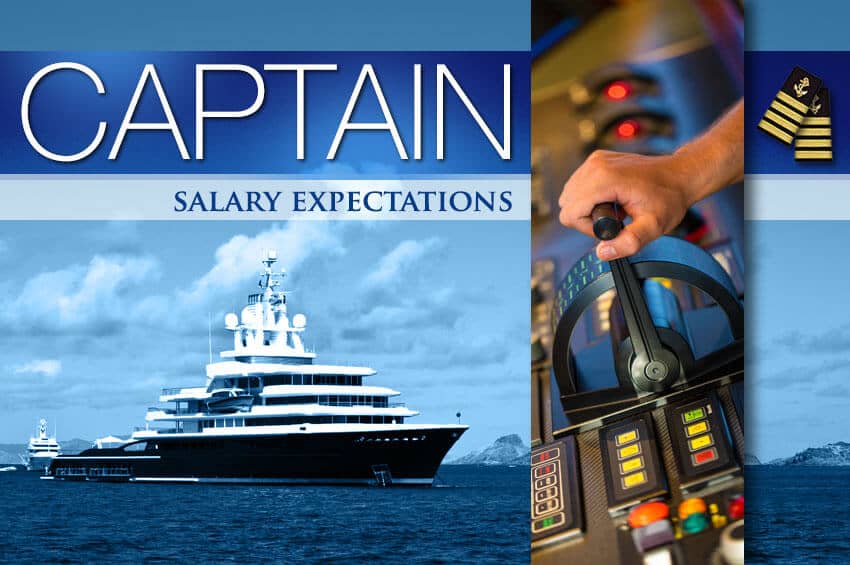
Captains of luxury yachts command a base salary well into six figures. Dependent on the length of the vessel, tenure of experience, and level of licensing yacht captain salaries range from $48,000 to over $300,000.
As the length of yachts increases, the complexity of the position of captain escalates. Although the job of yacht captain is often portrayed as one of luxury and leisure, it is a career choice of vast responsibility. While the exact details of a job description vary from program to program, the captain is the CEO of a small corporation. He/she reports to the Chairman of the Board - the yacht owner.
The Luxury Yacht Group webpage presents salary guidelines. Variation within the ranges reflect license level, experience and longevity of the captain 1 .
| Senior Master | 170 ft – 200 ft + | $144,000 - $300,000 |
| Captain | 100 ft – 170 ft | $84,000 - $180,000 |
| Junior Captain | 60 ft – 100 ft | $48,000 - $98,000 |
Additional parts of the salary package include bonuses, health insurance, flight expenses, paid vacation, training and certification cost reimbursement, and uniforms. Because the position requires residency aboard the vessel 24/7 all food and sundries are routinely supplied to crew. If the yacht is available for charter, the captain will also earn tips from charter guests. The industry is unique and each vessel in it has individual programs.
An average mega yacht with 12 crew has operating expenses between four and ten million dollars. The budget is based on where the yacht is moored, whether it is available for charter, and its travel destinations. On some yachts, a management company or a part of the owner’s business network handles accounting and makes financial decisions. On other yachts, the captain manages all aspects of the budget, chooses what charters to take and where to station the boat between charters, when and where to have yard work, and all personnel decisions.
A basic list of captain job responsibilities includes:
- Ultimate safety for passengers, crew, environment & vessel
- Achieving owner’s objectives?
- Crew hiring and dismissal?
- Personnel management?
- Shipyard/project management?
- Legal and regulatory compliance?
- Navigation?
Ultimate safety
The Captain holds the life of all aboard in his hands. He is also held accountable for the yacht itself and the environment. He must understand the mechanics of the boat, all electronic tools aboard, international regulatory requirements, and rules of the flag state.
Achieving owner’s objectives
Owner objectives are broad ranging. The captain is the mouthpiece for the interests of the owner. He holds the responsibility to reach outcomes which benefit the owner. The owner may simply require the captain to provide luxury service when he (she) is aboard. Some owners regularly use the vessel with family and guests, others may be aboard only occasionally. Charter periods for the vessel also factor into the objectives of the owner.
Crew hiring and dismissal
The requirements of the Marine Labor Convention (MLC) for contracting, dismissing, and managing are explicit and require strict adherence. Throughout any hiring or dismissal, the safety of the vessel and owner as well as issues of confidentiality must be assured by the captain. Identifying the best employees for the program involve a balance of certification, experience and personality.
Personnel management
Managing between 12 and 40 regular crew members aboard a mega/superyacht, day workers and seasonal hires is routine. From dive master, to stewardess, chef, and ETO, the captain must have a working knowledge of the positions and set expectations for performance. In a multi-cultural environment (both guests and crew), the example the captain sets for work ethic, responsibility, and communication optimizes yacht operations. The challenge is complicated by the close quarters of crew accommodations and the group working/living together 24/7.
Shipyard/project management
The Captain oversees issues of time and costs for routine maintenance and vessel upgrades. Knowledge of register and flag requirements are tools the captain uses to define the project, obtain quotes, and supervise the work.
Legal and regulatory
The maritime industry is dynamic. In addition to the flag state and regulatory requirements mentioned above, the captain must remain current with all Maritime Guidance Notices (MGN), Maritime Information Notes (MIN), amendments to all international marine safety codes, and product notices. A knowledge of the global differences in regulations, enforcement agencies and regional mores is critical.
Each vessel has a different business model. At a minimum, the captain is responsible for budget oversight and financial record keeping. If the owner engages a management company, the captain is the interface between the yacht and that organization.
The classic definition of a captain’s job is that of a navigator. Safely plotting a course, following the course, docking and departing from berths are all fundamental vessel handling skills. A seasoned captain has personal familiarity of cruising geographies. Despite the importance and skills required, a small percentage of a captain’s time is dedicated to task.
How does that list of responsibilities distill into the profile of a captain? It takes decades of training, hours logged, certification, and experience to reach the level of performance required to captain a mega/super yacht. In addition to each of those quantifiable requirements, elements of character and temperament differentiate captains.
- Calm and charismatic personality?
- Superior leadership, communication, management and diplomacy skills?
- Excellent boat handling and navigational skills?
- Excellent ISM and ISPS knowledge and practices?
- Excellent maintenance, engineering and technical / troubleshooting experience?
- Ability to remain calm and give directions in an emergency situation?
- Organized and methodical?
- Financial management, business acumen, management skills?
- Languages and cultural sensitivity
- Extensive maritime licensing
Leadership of the crew involves training, coaching and refereeing. When a captain steps into the position of leadership on a large vessel, it is understood that he has ten years (minimum) of increasing responsibility. Training and education were used during that decade to resolve situations without damage to vessel, harm of the environment, or human injury.
As manager and protector of the owner’s investment, the captain negotiates for goods and services. When issues arise, it is the captain who develops options and makes recommendations. Using the comparison to a traditional business, the CEO (captain) and the President of the Board (owner) interface on strategic decisions.
The mega yacht captain is more than just an asset manager. The captain implements owner preferences in order to assure him the best yachting experience. Once an owner has determined the style of yacht he wants to own - how, when, where they want to use vessel - costs of operating and budget generalities are defined. The ultimate goal of captain and crew is the happiness of the owner(s) and their guests. Crew is the primary factor in the owner/guest experience and in a successful program. The captain fully understands and manages the limitations of vessel and crew.
As vessels increased in length, machinery and electronics increased in complexity. In parallel with those changes, regulatory agencies and flag states requirements escalated. The requirements of International Safety Management Code (ISM) and International Ship and Port Security Code (ISPS) reflect the challenges of operating a mega yacht. The captain holds responsibility for implementing all requirements aboard and remaining current with the changes made to respond to new issues within the industry.
During the last decade, the number of superyacht hulls nearly doubled. Based on the 2010 Global Order Book, the superyacht industry managed to grow even during the financial crisis of 2008. The Knight Frank Wealth Report (2016) for the decade concluded that the wealth required to maintain a yacht appears impervious to economic cycles. It does project a slight worldwide slowing of the number of ultra-high-networth individuals during the upcoming decade.
How does that economic data translate into job opportunity for yacht captains who have followed the established career path? How resilient is the opportunity during periods like the global downturn experienced in 2008?
Marcy Laturno, Director of Crew Placement & Charter Specialist at Luxury Yacht Group answered:
A long-term mega yacht captain added:
Securing a position as captain aboard mega and super yachts is competitive. Although new builds are released every year, each year there are additional individuals who have established professional credentialing and adequate experience aboard. Professional captains seek positions where they can assemble a stable crew, build longevity and establish a relationship with the yacht owner.
The position of mega/super yacht captain commands a salary which reflects the level of responsibility and the years of personal and professional development. A relatively small number of positions creates a competitive job market where longevity and experience are rewarded.
- Luxury Yacht Group website

Engineering License Changes
The MCA has restructured the engineering certifications. The MEOL course has been done away with, and the AEC course made mandatory and more thorough. Luxury Yacht Group explains all these changes, what engineers progressing through the ranks can do now, and how Y ticket holders can convert their licenses over to the structure.
14 Mar 2018
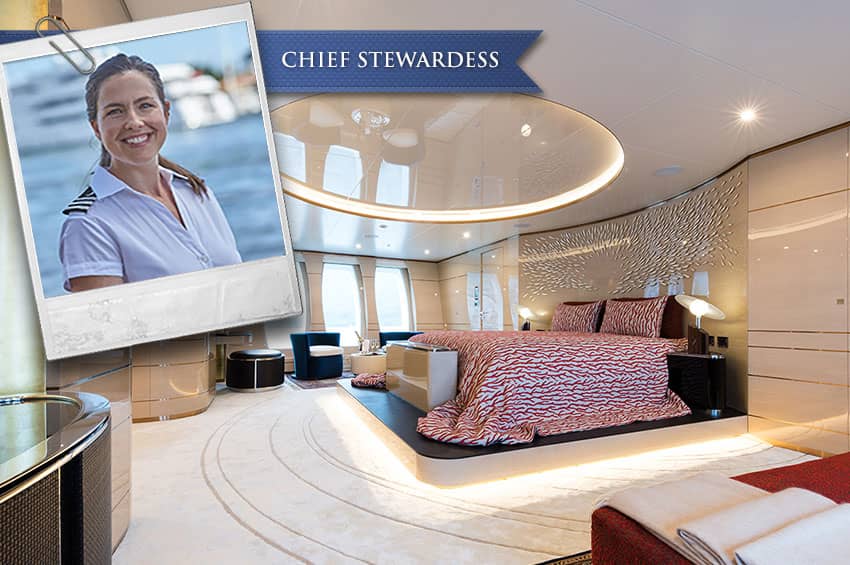
A Day in the Life Series – Chief Stewardess
For a yacht to run smoothly, it requires many working parts, and the interior department is a large component of this. The chief stewardess oversees this department and makes sure all the stewardesses onboard know what their tasks and responsibilities are. The interior department is largely in charge of the guest services whilst they are onboard, and responsible for interior maintenance of the yacht when they are not.
18 Dec 2017
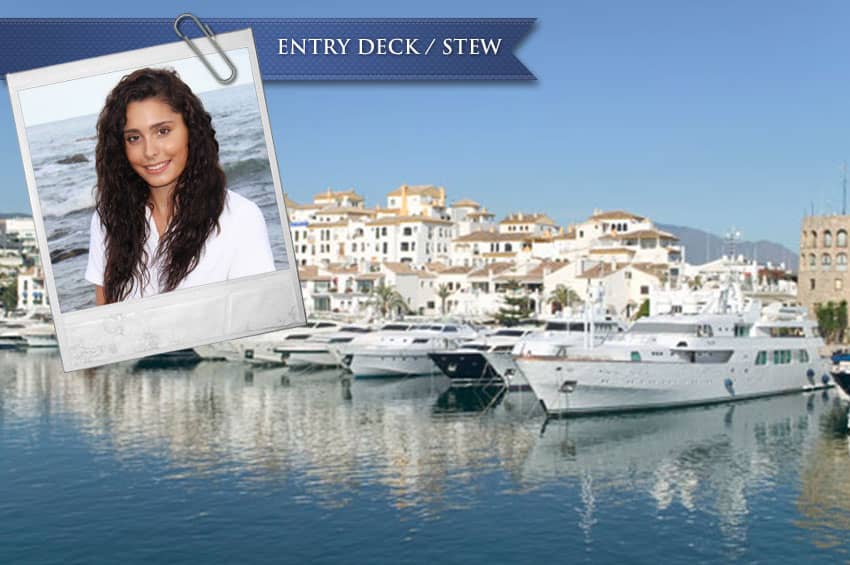
A Day in the Life Of Series - Entry Stewardess
Joining the yachting industry is an exciting and daunting undertaking. In this two part interview we speak with Melanie about why she decided to join the superyacht industry, what her hopes and goals are, and what she has learnt so far as an entry level stewardess.
29 Nov 2017
Rescuers racing to reach Spirit of Mateship yacht in distress off NSW coastline, 185 kilometres east of Nowra
By Danuta Kozaki
Topic: Maritime Accidents and Incidents
The 19-metre yacht is roughly 150 kilometres offshore from Nowra. ( Supplied: Rolex/Daniel Forster )
A major rescue mission has been launched to retrieve two people stuck on board a 19-metre yacht roughly 185 kilometres off the New South Wales coastline.
NSW Police said officers were informed of the yacht's distress call at about 1pm on Monday.
What's next?
Rescue teams are expected to rendezvous with the vessel early on Wednesday morning.
A major rescue mission has been launched off the New South Wales South Coast, following a distress beacon being activated on the Spirit of Mateship yacht.
The distress beacon was switched on about 185 kilometres east of Nowra.
NSW Police said officers were notified of the distress call at about 1pm on Monday.
"Officers from the Marine Area Command and Australian Defence Force were notified by the Joint Rescue Co-ordination Centre a 19-metre yacht had activated a distress beacon," NSW Police said in a statement.
A spokesperson for the Australian Defence Force said HMAS Arunta was currently heading towards the 19-metre yacht. ( Supplied: Royal Australian Navy )
A spokesman for the Australian Defence Force said that two people were on board the yacht.
On Tuesday night, the Australian Maritime Safety Authority (AMSA) said it was battling up to five-metre seas and 70 to 90 kph winds, with the weather conditions preventing rescue efforts from taking place on Monday night.
A RAAF C-130J Hercules aircraft stayed on the scene until 9pm after leaving from Richmond, but was forced to return.
"HMAS Arunta arrived to the scene at 6pm AEST this evening, with HMAS Canberra on route also arriving at 11pm AEST," AMSA said in a statement. "NSW Water Police vessel Nemesis is expected to arrive on scene about 2am AEST tomorrow [Tuesday] morning."
The rescue operation is due to begin early on Wednesday, but whether or not it can begin then will depend on the weather.
The Spirit of Mateship is believed to have sustained a mechanical issue and is taking on water.
Yacht a Sydney to Hobart race veteran
The Spirit of Mateship has raced in several Sydney to Hobart yacht races, starting in 2013.
Ahead of its inaugural Sydney to Hobart race, then-prime minister Tony Abbott officially launched its name Sprit of Mateship in honour of its crew, made up of injured ADF personnel.
Speaking at an event at the National Maritime Museum in Sydney before the race, Mr Abbott said how proud he was to be part of its launch.
The yacht in distress, named Spirit of Mateship, previously raced in a number of competitions, including the Sydney Hobart Yacht Race. ( ABC: 7.30 )
"It is really good to be here at Mates 4 Mates and to help launch the Spirit of Mateship," he said.
"We owe it to the members and former members of our armed forces to stand by them in their time of need and Mates 4 Mates are people who are there for each other in tough times."
NSW Police said there were no reports of injuries on board the yacht.
Real median household income rose sharply in 2023—a testament to the strength of the economic recovery
Today’s Census Bureau data on earnings, income, and poverty in 2023 confirmed many of the predictions made in our preview last week. The strong labor market and falling inflation translated into increases in real median household income and decreases in the official poverty rate.
Real (inflation-adjusted) median household income increased by 4.0% to $80,610, the first increase since the pandemic. Between 2022 and 2023, the labor market added 3.5 million jobs while real wages increased. Considering most households rely on income from work to make ends meet, it’s no surprise that median household income increased in 2023.
Today’s data highlight the extraordinary strength of the recovery from the economic crises caused by the pandemic, a recovery driven by policy choices—particularly large fiscal relief and recovery packages—that aimed to quickly heal the labor market. The rapid growth of household incomes charted in today’s data is powerful evidence that the policy approach of recent years was the right choice.
Officially, median household income for 2023 is statistically indistinguishable from the last income peak of 2019. While that is the case in the official data, it is important to note that there were significant data collection issues in the survey for 2019 as responses were collected just as the pandemic hit in early 2020. The pandemic disruptions introduced significant “nonresponse bias”—meaning it was harder to talk to households to collect the data, and the households who were harder to reach were disproportionately lower income. This nonresponse bias boosted income measures in 2019 artificially. Census Bureau researchers subsequently estimated that this bias meant that real median income was 2.8% lower in 2019 than reported in the initial release. If we applied this data correction to income levels in 2019, this would mean that real household incomes in 2023 rose above 2019 levels and are now at their highest level on record.
Other welcome news include that income for lower-income households rose faster than for those at the median or at the top. Income for the 10 th -percentile household increased 6.7% between 2022 and 2023. Income for high-income households—at the 90th percentile—rose 4.6%. This significant increase for lower-income households led to a drop in the official poverty rate of 0.4 percentage points to 11.1% in 2023.
Enjoyed this post?
Sign up for EPI's newsletter so you never miss our research and insights on ways to make the economy work better for everyone.
- SI SWIMSUIT
- SI SPORTSBOOK
- Husky Legends
Jedd Fisch Makes Donation to 'Arms Race' for Huskies
Dan raley | sep 10, 2024.

By making a sizable financial investment, Jedd Fisch just put down some deeper roots at the University of Washington.
On Monday, the Husky football coach for the past nine months confirmed he and his spouse Amber will donate $1 million toward the Go BIG! for Washington campaign, a fund-raising effort to support facilities, operating budgets and name, image and likeness improvements across the board in the athletic department.
The school is attempting to raise $300 million over five years, suggesting that's what it will take to make the UW competitive with the rest of the Big Ten conference. This will affect all 22 Husky sports that involve 650 athletes.
Fisch, who makes a $7.75 million annual salary as the Husky football coach, felt it was necessary for him to show his monetary support to encourage others to join in.
"We are going against the best of the best In this ever-changing environment of college football," he said. "I think it is so critical that there's an investment made from the inside out, from the top down, however you want to look at it. That our community realizes the commitment that we're making is one in which we ask others to make, as well. and one in which we know we need to make if we're going to complete at the highest level."
While nothing is binding for him and his UW job with this action, it should reassure fans that Fisch envisions staying longer in Montlake than, say, his predecessor, Kalen DeBoer, who left after two seasons as football coach for Alabama.
Fisch seems comfortable coaching in the Big Ten and embracing the significant challenge that it presents.
"The Big Ten is an arms race in itself, both in NIL and facilities, and operating budgets, travel budgets," he said. "You're making sure you're top of the line in all areas."
While the university is still paying off a $280 million renovation of Husky Stadium in 2013, Fisch already has upgraded the football weight room with more equipment and says it's time for the locker rooms, meeting rooms, training areas and other program offerings to get a refresh.
"The guys who are coming to visit us in recruiting are going on their next trip to Michigan and their next trip to Ohio state and their next trip to Oregon, and we've got to look the same and feel the same," the coach said. "Those kids have got to feel like they're getting the same commitment."
The UW provided a football locker-room upgrade in 2017, which Fisch says already is outdated in just seven years. Across college football, he noted how Texas twice has renovated its football locker facilities in that time and how Michigan two months ago opened a new $7 million locker area.
Weighty NIL collectives and state-of-the-art facilities are mandatory for the Huskies' overall football success, the coach reiiterated.
"In the Big Ten, if you don't have both," Fisch said, "you're going to be left behind."
For the latest UW football and basketball news, go to si.com/college/washington

Dan Raley has worked for the Seattle Post-Intelligencer, Atlanta Journal-Constitution and Fairbanks Daily News-Miner, as well as for MSN.com and Boeing, the latter as a global aerospace writer. His sportswriting career spans four decades and he's covered University of Washington football and basketball during much of that time. In a working capacity, he's been to the Super Bowl, the NBA Finals, the MLB playoffs, the Masters, the U.S. Open, the PGA Championship and countless Final Fours and bowl games.
- Share full article

The Palace Coup at the Magic Kingdom
The inside story of how Bob Iger undermined and outmaneuvered Bob Chapek, his chosen successor, and returned to power at Disney.
Credit... Philip Cheung for The New York Times
Supported by

By James B. Stewart and Brooks Barnes
- Sept. 8, 2024
At 5 p.m. on Feb. 25, 2020, Bob Chapek and Bob Iger settled into matching directors’ chairs on the Disney studio lot for a series of live media interviews. The company had just shocked pretty much everybody by announcing that the little-known Mr. Chapek would be replacing the wildly popular Mr. Iger as chief executive.
The bald and stocky Mr. Chapek and the graying but still debonair Mr. Iger struck an immediate contrast, even though both were dressed in navy suits and open-collar white shirts and both were named Bob. To avoid confusion, some referred to them as “Bob One” and “Bob Two,” or “Big Bob” and “Little Bob” (even though Mr. Chapek was taller and heavier). And then there was “Handsome Bob” and “Boring Bob.”
In an interview with Julia Boorstin of CNBC, Mr. Chapek fawned over his predecessor. “I obviously have huge shoes to fill,” he said with wide eyes, hailing Mr. Iger’s “magic” running Disney. Mr. Iger’s 15-year tenure as chief executive had been so successful that he had considered running for president as a Democrat. Queen Elizabeth II knighted him just before she died.
Mr. Iger said he and Mr. Chapek had worked together “extremely well,” but in the next breath qualified that praise: “Actually, our senior management team has worked together quite well.”
Mr. Chapek listened in vain for something more effusive, more personal.

As the questions — and the attention — shifted entirely to Mr. Chapek, Mr. Iger’s usually relaxed demeanor stiffened. His gaze shifted down, away from Mr. Chapek, and he looked increasingly uncomfortable. He crossed his arms.
Mr. Chapek was intimately familiar with Mr. Iger’s body language and expressions. “This is not good,” he thought.
He was right about that. But little did he realize that he and Mr. Iger were about to face off in an epic corporate power struggle with few rivals in business history.
When Mr. Iger stepped down as chief executive — abruptly, just weeks before the coronavirus pandemic plunged Disney into the worst crisis in its history — the company’s board agreed that he could stay on as “creative director” and executive chairman of the board for another two years.
That agreement nearly fell apart over the issue of whom, exactly, Mr. Chapek would answer to: Mr. Iger or the board. A last-minute compromise, reached without a board vote, had Mr. Chapek reporting to both. That proved a recipe for conflict — as Mr. Chapek soon began to realize.
Just weeks into his tenure as chief executive, Mr. Chapek expressed frustration. “I can’t survive another two years of this,” Mr. Chapek told Arthur Bochner , his chief of staff. Mr. Iger is “not going to leave. He’ll be here until he dies.”
Mr. Bochner worried that Mr. Chapek would quit. Mr. Chapek was ultimately deprived of even that option. The board fired him just before Thanksgiving in 2022.
As he had feared, his successor was Mr. Iger.
The New York Times has pieced together what happened inside Disney during those fateful months by talking to scores of people directly involved. Many of them talked extensively for the first time about what transpired, some only on the condition of anonymity because of their nondisclosure agreements with Disney. In each instance in which a past conversation is reconstructed in this article, the spoken words have been confirmed by multiple people with knowledge of the conversations.
Those conversations reveal how Disney’s board and executive ranks were consumed by conflict and drama just as the company was facing historic upheaval in the entertainment industry. When the pandemic hit, right as Mr. Chapek took over, the company had to temporarily close its highly profitable theme parks. In spring 2022, the streaming bubble burst, causing investors to flee all media stocks, including Disney’s.
But inside Disney, much of the focus was on trying to manage the tensions between Mr. Iger and Mr. Chapek.
Those problems have renewed importance now, as Disney embarks on yet another quest to find someone to succeed Mr. Iger, whose contract ends on Dec. 31, 2026.
The ‘Snake Pit’
For a company that bills its theme parks as the “Happiest Place on Earth,” Disney’s corporate headquarters have long been anything but — a hotbed of intrigue and power struggles. Mr. Chapek’s former chief of staff told people the company’s sixth-floor executive suite was a “snake pit.”
Mr. Iger ascended almost two decades ago, after a power struggle between Michael Eisner, a long-serving chief executive, and Roy E. Disney, Walt Disney’s nephew and a Disney board member. By that time, Mr. Eisner had already elevated and then dispatched two handpicked successors, Jeffrey Katzenberg, who became a co-founder of DreamWorks, and Michael Ovitz, once the most powerful agent in Hollywood.
Mr. Iger, who started his career as a weatherman on a cable channel in upstate New York, had vowed to never follow in Mr. Eisner’s footsteps. To friends, he mocked Mr. Eisner’s fears about leaving Disney — that his calls to power brokers would go unreturned, and that he wouldn’t be able to get reservations at top restaurants. He told Mr. Chapek and others that he would never stay more than 10 years.
Mr. Iger seemed well on his way to honoring that pledge. Once, while Mr. Chapek was running Disney’s consumer products division, Mr. Iger paid a rare unscheduled visit to Mr. Chapek at his office several miles from corporate headquarters. Mr. Iger asked whether Mr. Chapek thought Jay Rasulo or Tom Staggs, two top lieutenants, should succeed him as chief executive.
“Do you want my honest answer?” Mr. Chapek replied. “Neither.”
“That’s what I thought you’d say,” Mr. Iger said, according to Mr. Chapek, and then proceeded to list their respective faults.
It was Mr. Chapek’s first inkling that he might be Mr. Iger’s actual choice as successor.
But his hopes were dashed when, in February 2015, Mr. Iger named Mr. Staggs, then the theme park chairman, as chief operating officer and presumptive heir. Around the same time, the board extended Mr. Iger’s contract two years, to 2018, with the expectation that Mr. Iger would spend much of that time grooming Mr. Staggs as his successor.
But Mr. Iger soured on him. He complained that Shanghai Disneyland, Mr. Staggs’s project, was behind schedule and over budget. Mr. Iger pushed out Mr. Staggs in April 2016.
Mr. Chapek was back in the running.
He had started at Disney in 1993 in the VHS tape department, eventually rising to oversee all movie distribution. In 2011, he took over Disney’s consumer products division, which soon became flush with “Frozen” merchandise sales. By 2015, Mr. Chapek had been promoted to run theme parks, overseeing at least $24 billion in capital investments , including new “Star Wars,” “Avengers” and “Toy Story” rides.
Mr. Chapek was the consummate company man, loyal to Mr. Iger to the point of obsequiousness. Alone among Disney senior managers, he routinely called Mr. Iger “Boss” rather than “Bob,” which Mr. Iger found endearing.
At the same time, Mr. Chapek lacked Mr. Iger’s charisma and wasn’t a natural communicator; even Mr. Chapek acknowledged that he had low “E.Q.,” or emotional intelligence. Mr. Iger urged him to work on his bedside manner.
Mr. Iger told Mr. Chapek to schedule a series of one-on-one meetings with Disney’s directors to build a rapport and lay out his vision for the company’s future. But in late 2017, Disney reached a deal to buy the entertainment assets of 21st Century Fox. Mr. Iger received a big bonus for consummating the deal — stock awards of up to $142 million at the then-current share price — and the board extended his contract for a sixth time . He would now retire at the end of 2021.
Mr. Chapek canceled his plans to meet directors.
Is There Life After Disney?
A Disney chief executive is an instant celebrity. He (they’ve all been men) presides over what are perceived as some of the most powerful and glamorous businesses in the world: the Marvel, Disney, Pixar, Lucasfilm and 20th Century movie studios; the ABC broadcast network and news division; cable channels like ESPN, FX and National Geographic. Its 12 theme parks attracted a combined 142 million visitors in 2023. And even by chief executive standards, the pay is enormous. Forbes estimates Mr. Iger’s net worth at over $700 million.
With a yacht, corporate jet, power and influence, Mr. Iger and his wife, Willow Bay, a former television anchor and the current dean of the University of Southern California’s journalism school, hobnobbed with a rarefied crowd: Barack and Michelle Obama, Jeff Bezos, Steven Spielberg, David Geffen and Oprah Winfrey, to name just a few.
Once in the job, Mr. Iger wondered, as did Mr. Eisner before him: If stripped of his power and multimillion-dollar compensation at Disney, would his allure diminish? For several years, the license plate holder on Mr. Iger’s silver Porsche posed the question, “Is there life after Disney?”
There were aspects of the job that Mr. Iger didn’t especially enjoy, like earnings presentations and being grilled by Wall Street analysts. He had grown tired of budget meetings.
He often complained to Mr. Chapek (and board members) about his compensation. It was a frequent source of tension between him and Susan Arnold, who sat on the compensation committee for many years. Mr. Iger pointed repeatedly to Leslie Moonves, the chief executive of CBS, who was paid more than him even though CBS was much smaller and less complex. In 2017, Mr. Moonves made $69.3 million , Mr. Iger $36.3 million, barely half that. One Disney director called it “Moonves envy.” In 2018, shareholders rejected Mr. Iger’s compensation in a nonbinding vote; Disney won approval in 2019 only after Mr. Iger agreed to a smaller package .
Mr. Iger also pondered a conversation he’d had with Steve Jobs shortly before the Apple co-founder died in 2011. Mr. Jobs had urged Mr. Iger not to stay so long at Disney that he ended up depriving himself of some of the great things life had to offer.
When the company’s board met in December 2019, Mr. Iger broached the idea of stepping back — but not leaving entirely. “Why don’t we accelerate the process?” Mr. Iger suggested. Mr. Chapek was his choice to succeed him. Mr. Iger told the board that Mr. Chapek knew the brand well, respected it and would do no harm. He also said Mr. Chapek had great integrity.
One of Disney’s directors, Mark Parker, had recently decided to step down as chief executive of Nike and become executive chairman. Mr. Iger pitched doing the same thing. That model would allow him to stay at Disney for the remainder of his contract doing what he liked best, overseeing the company’s creative endeavors. Mr. Chapek would become the C.E.O. and handle everything else. A crucial element was that all the division leaders would report to Mr. Chapek, but Mr. Chapek would report to Mr. Iger, leaving Mr. Iger ultimately in charge. There was an obvious financial incentive as well: Mr. Iger still had more than $100 million in unvested stock options and his leadership could help protect its value.
Safra Catz, the chief executive of Oracle and a Disney board member, pushed back. Why make Mr. Chapek chief executive rather than chief operating officer?
Mr. Iger said he didn’t want a rerun of the situation with Mr. Staggs, in which people thought Mr. Staggs was merely auditioning for the top job and they could outmaneuver him by going to Mr. Iger.
But in a rare show of resistance, the board was unpersuaded. It agreed to consider the issue over the holidays.
By the time board members met in late January 2020, in Los Angeles, they had come around. Mr. Iger told Mr. Chapek the good news immediately afterward, saying an announcement would be made in just three weeks on Feb. 25.
Why the rush? Zenia Mucha , Disney’s chief communications officer and a close adviser to Mr. Iger, counseled delay; she disagreed with the entire plan, including the selection of Mr. Chapek. But Mr. Iger was adamant.
By mid-February, the coronavirus was spreading widely, and the pressure it could put on the company was becoming clear. Mr. Iger had received a detailed briefing in New York from the ABC News team covering the story. Disney’s theme parks in Shanghai and Hong Kong had already closed.
David Jefferson, a Disney spokesman, said the pandemic had nothing to do with the timing of the leadership change. Board members agree but, when pressed, offer no explanation for the haste other than that was what Mr. Iger wanted.
‘Don’t Step on His Toes’
When Mr. Chapek shared the good news of his promotion with his wife, Cindy, she was skeptical. “We’ve heard that before,” she told him. But the board’s lead independent director, Ms. Arnold, flew from her home in Oregon to meet with Mr. Chapek in the Rotunda, as Disney’s executive dining room is known. There, she confirmed that he was the board’s unanimous choice to succeed Mr. Iger as C.E.O. “This is happening,” Ms. Arnold assured him.
Mr. Chapek was told there was no time for him to meet with other directors. While they had met with Mr. Chapek in his previous roles, the idea that there was no time or no need to interview him to assess his capacity to serve as chief executive, not to mention explore his vision for the future of a company in the midst of profound change, seems inexplicable.
Ms. Arnold recognized that the unusual arrangement, in which Mr. Iger would be staying on as executive chairman and chief creative officer, posed a potential for conflict. She urged Mr. Chapek to show him deference. “Give him a wide berth” on creative matters, she advised. “Don’t step on his toes.”
Notably, Mr. Chapek would not be joining Disney’s board, which was unusual, given that nearly all chief executives also serve as board members, in many instances as chair. But the board wanted a probation period for Mr. Chapek, and wanted to emphasize that he would be reporting to Mr. Iger. It would be awkward if Mr. Chapek were also a member of the board responsible for Mr. Iger’s oversight.
In the days before the announcement Mr. Iger told just a handful of top executives, among them Christine McCarthy, the chief financial officer. Like almost everyone who learned the news, she was taken aback. While pledging to help Mr. Chapek succeed, she pointed out some of his weaknesses: He knew next to nothing about the television business, he didn’t know anything about sports programming, he didn’t have many relationships with Hollywood talent, he hadn’t dealt with Wall Street.
Mr. Iger agreed that Mr. Chapek didn’t come across as especially creative. But Mr. Iger had faced the same criticism when he was named president of ABC Entertainment in 1989.
“I think he can do it,” Mr. Iger insisted. “And I’ll still be around.”
A Last-Minute Hitch
On Feb. 24, the eve of Mr. Chapek’s announcement, the succession plan nearly fell apart.
Alan Braverman, Disney’s long-serving general counsel, called Mr. Iger to say that under the company’s bylaws, the chief executive had to report to the board — not to Mr. Iger. For Mr. Iger, that was a nonstarter. He wanted to retain ultimate control.
It was Mr. Braverman and Ms. Mucha who came up with a hastily conceived compromise: Mr. Chapek would report to both the board and Mr. Iger.
That was OK with Mr. Iger since, from his perspective, Mr. Chapek still reported to him. Mr. Iger insisted that the announcement be made the next morning as scheduled — even though board members hadn’t discussed as a group, let alone approved, the new dual reporting arrangement.
No one told Mr. Chapek about the change to the reporting structure. But Mr. Chapek wasn’t very concerned about it, because Mr. Iger had always been such a strong supporter of his.
In another sign that Mr. Iger intended to maintain a visible presence, he decided to stay in the office that both he and Mr. Eisner had occupied as chief executives. Mr. Chapek was relegated to smaller quarters nearby. The arrangement only added to internal confusion about Mr. Chapek’s new status.
Some board members weren’t thrilled with the office decision or the dual reporting change. But, as it had in so many instances, the board went along with what Mr. Iger wanted.
Mr. Chapek and Mr. Iger faced the cameras as planned the next day. The company’s announcement said the change was “effective immediately.”
The sudden move shocked and baffled Hollywood. Paul McCartney, a close friend of Mr. Iger’s, called him to ask if he was sick.
Iger’s ‘Lap Dog’
About two weeks later, on March 11, Mr. Chapek was scheduled to make his formal debut as chief executive at Disney’s annual shareholder meeting. Mr. Chapek was nervous, all the more so because public speaking had never been his strength.
Before the meeting, Disney’s investor relations personnel assembled thick briefing binders covering every conceivable data point and question that might arise. Armed with these binders, Mr. Iger and Mr. Chapek settled into the front compartment of the Disney Gulfstream jet for the four-and-a-half-hour flight to Raleigh, N.C., the site of that year’s meeting, for what Mr. Chapek expected would be an extended preparation session.
Several passengers, including Mr. Chapek, recalled that Mr. Iger pulled out his iPad and started flipping through recent photographs, telling the stories behind them. There were photos of himself with Mr. McCartney and recent dinner guests in New York. Mr. Chapek said he tried to steer the discussion back to the annual meeting, but Mr. Iger interrupted: “Did you see my new yacht design?”
Flustered by Mr. Iger’s digressions, Mr. Chapek got up and moved to the plane’s rear compartment.
(Others on the flight said Mr. Chapek immediately went to the back of the plane and didn’t recall his having any iPad chitchat with Mr. Iger.)
Mr. Chapek’s extended absence was noted in the front cabin. “Does Bob want to get briefed or not?” Mr. Iger asked his fellow passengers, Ms. McCarthy, Ms. Mucha and Mr. Braverman. Finally, Mr. Iger stood up and went to find Mr. Chapek.
“Bob, do you want to sit with us so we can brief you?” Mr. Iger asked.
“Isn’t it all in here?” Mr. Chapek replied, holding up the binder. Mr. Iger said the book couldn’t convey the nuances. But Mr. Chapek said he’d review the book and let him know if he had any questions. He went back to his reading.
“He doesn’t want to be prepped. He says the book is enough,” an incredulous Mr. Iger told his fellow passengers when he returned to the front compartment. Mr. Iger suddenly felt as if he were at the wedding altar with the bride walking down the aisle. He realized he’d made a terrible mistake. But it was too late.
On the way back to California, Gov. Gavin Newsom called Mr. Iger before announcing that he would restrict public gatherings in California because of Covid. But he thought Disneyland might stay open. The governor didn’t want people to panic — and he feared they might if Disneyland closed.
Mr. Iger argued to Mr. Newsom that keeping the theme park open was a bad idea, given the health risks to both guests and employees. Mr. Newsom later publicly praised Mr. Iger’s advice and cooperation.
Mr. Chapek didn’t disagree with the decision to close the parks, but he was furious that Mr. Iger had excluded him. The decision had nothing to do with Mr. Iger’s creative mandate.
Disney’s executives worried about the shock that the park closures would have on the company’s cash flow. Ms. McCarthy and Mr. Chapek made the decision to quickly furlough, albeit with health benefits, more than 90,000 employees at the theme parks.
But Mr. Iger overruled them. He decided to wait until the government passed a Covid relief bill.
Two months earlier, when Mr. Chapek and Mr. Iger had appeared together on CNBC, Mr. Iger brushed aside a question about the potential for confusion over who was in charge. “Bob is going to be running the company,” Mr. Iger said. But now it seemed to Mr. Chapek that Mr. Iger was acting as though nothing had changed — Mr. Iger was still chief executive in all but name.
Mr. Chapek’s wife told him he was little more than Mr. Iger’s “lap dog.”
‘He’s Killing Me’
However marginalized Mr. Chapek felt, the two maintained at least a facade of cooperation. Because of Covid, no one went into the office, but Mr. Chapek spoke to Mr. Iger weekly by phone and sometimes went to see him at his home in Brentwood, an upscale Los Angeles neighborhood where they took walks wearing masks. Mr. Iger never went to see Mr. Chapek at his home in Westlake Village, a far-flung suburb. (A spokesman for Mr. Iger said he had never been invited.)
At Mr. Chapek’s request, the two held a series of employee town-hall meetings, where Mr. Iger was supposed to reinforce the message that Mr. Chapek was now in charge. “My goal is for Bob to be successful, and to the extent that I can help him do that, I will,” Mr. Iger said at the first town hall they held in February 2020. “I think it’s got to be a balance between giving him the freedom to make the decisions and do things the way he wants to do them because, you know, they will feel right to him. On the other hand, I’ve got a fair amount of experience doing a lot of these things. And, you know, it’s not quite about throwing him into a swimming pool when he’s never swum. So it’ll be a balance.”
But nearly everything Mr. Chapek did (or didn’t) do reinforced Mr. Iger’s sense that naming Mr. Chapek as his successor had been a huge mistake. Mr. Iger expressed his frustration with friends in Hollywood. Word spread, and someone contacted The New York Times’s media columnist at the time, Ben Smith, to say Mr. Iger was reasserting control. Mr. Smith called and spoke to Mr. Iger, too, who followed up with an email.
On Sunday, April 12, Mr. Chapek hosted a belated late-afternoon party for family and friends at his home to celebrate his promotion. A friend emailed him Mr. Smith’s column, which had just appeared online. Mr. Chapek stepped out of the party and read it.
“After a few weeks of letting Mr. Chapek take charge, Mr. Iger smoothly reasserted control,” Mr. Smith wrote . Mr. Chapek read with mounting disbelief.
Mr. Smith called Mr. Chapek “the new, nominal chief executive” and even speculated that the choice of Mr. Iger’s successor “may be open again.”
Mr. Smith quoted Mr. Iger as saying in an email that “a crisis of this magnitude, and its impact on Disney, would necessarily result in my actively helping Bob [Chapek] and the company contend with it, particularly since I ran the company for 15 years!”
Mr. Chapek immediately called Ms. Mucha, the communications executive. “What the hell is this?” he demanded. Trying to calm him, she argued the column wasn’t that bad.
“He’s killing me,” Mr. Chapek responded.
Mr. Chapek didn’t sleep that night. Early the next morning, he confronted Mr. Iger on the phone.
Mr. Iger denied that he had spoken to Mr. Smith, which only further enraged Mr. Chapek, who pointed out that Mr. Iger’s quote came directly from an email. Mr. Iger said he didn’t understand why Mr. Chapek was so upset. What was wrong with saying he was reasserting control in the midst of a crisis?
“You’ve cut my legs out from under me,” Mr. Chapek said. “I’ve never felt worse in my life.”
The conversation became heated, and both men raised their voices.
Mr. Iger told several people immediately afterward that he’d never been treated with more disrespect by anyone in his entire life.
As far as Mr. Iger was concerned, his relationship with Mr. Chapek was over.
‘This Too Shall Pass’
Starting at 6 a.m. on Monday, Jayne Parker, Disney’s chief human resources officer, called Disney directors to alert them to Mr. Chapek’s fury. She got one out of bed to take the call.
An enraged Mr. Chapek got on the phone with Ms. Arnold, the board’s lead independent director. This was the first time he’d broached the feud with a director. He hadn’t wanted to call attention to something that seemed petty compared with a global pandemic, but he felt this could no longer be ignored.
Mr. Chapek, who deemed some other board members fiercely loyal to Mr. Iger, felt he’d developed a good rapport with Ms. Arnold, who had spent most of her career in the Midwest at Procter & Gamble, eventually becoming its first woman president. Mr. Chapek, the son of a machinist from Hammond, Ind., had gotten his start in packaged goods, working in the pet-food division at Heinz and helping to market Kraft cheese.
Ms. Arnold also knew something about corporate succession: She’d been a leading candidate to become Procter & Gamble’s chief executive but took herself out of the running and left the company in 2009, partly because, as a prominent gay executive, she didn’t want her personal life to be publicly scrutinized, something that would most likely accompany the job.
Ms. Arnold was taken aback by the vehemence of Mr. Chapek’s reaction to the column. She thought he seemed paranoid that Mr. Iger was out to destroy him. She urged him to calm down and defer to Mr. Iger, as she had advised before.
“What will be left of my reputation?” Mr. Chapek pleaded.
“This too shall pass,” she responded. Mr. Iger would be gone in 20 months, and the C.E.O. prize would be Mr. Chapek’s alone.
Mr. Chapek all but begged to be named to the board as a show of confidence in him. Ms. Arnold conferred with several other directors. None was aware of the depth of the hostility that had developed between Mr. Iger and his designated successor. But they agreed it could damage his standing. The board now felt it had no choice but to name Mr. Chapek a director as a show of support.
Ms. Arnold called Mr. Iger and chastised him for the column. She told him it was the worst thing that could have happened to Mr. Chapek. She pointed out that, had Mr. Iger taken the board’s suggestion to initially name Mr. Chapek chief operating officer rather than chief executive, none of this would be happening. In any event, the sniping had to stop.
Mr. Iger was taken aback by both the tone and substance of Ms. Arnold’s call. She seemed to be siding with Mr. Chapek — even though he had been C.E.O. for less than two months and Mr. Iger was still ultimately in charge. She and other board members should be happy he was stepping back up during a crisis, Mr. Iger thought, especially when Mr. Chapek’s leadership had been so lackluster.
On April 15, three days after Mr. Smith’s column published, Mr. Chapek was named to Disney’s board .
In June, the board scheduled private sessions by video call with both men to address the conflict. Mr. Iger went first. He aired his complaints about Mr. Chapek’s leadership, including that he hadn’t sought Mr. Iger’s advice and counsel. Mr. Chapek had no standing in the creative community and hadn’t made any efforts to improve it. He’d skipped creative meetings that Mr. Iger had invited him to.
Mr. Chapek said he was sorry their differences had become a board issue. But he was incensed when Mr. Parker, the board member who had led Nike, questioned Mr. Chapek’s lack of contacts in the Hollywood creative community, since that was supposed to be Mr. Iger’s jurisdiction. He insisted that he hadn’t skipped meetings but rather that Mr. Iger had scheduled them without telling him. Mr. Chapek said Mr. Iger had ceded little authority, something Mr. Chapek said he had accepted without complaining. “I was just trying to be a good soldier,” Mr. Chapek said.
The board’s message to both men: The company was in crisis, and they needed to start acting like adults and work together.
Later, in an audit committee board session with Ms. McCarthy, Ms. Catz, the board member who had questioned Mr. Chapek’s readiness, asked if she thought Mr. Chapek was up to the job. Ms. McCarthy, the chief financial officer, didn’t immediately answer.
“I don’t like the fact that you’re hesitating,” Ms. Catz said.
“I’m giving you a qualified answer,” Ms. McCarthy said. “If he will start to listen. If he will listen. We’re all trying to help him, but he doesn’t listen.”
In the ensuing months, Mr. Iger seemed increasingly cranky about the board’s reaction to Mr. Smith’s column. “Why are you so hostile toward the board?” Mr. Chapek finally asked during one of their calls, which had continued despite the tensions.
Mr. Iger told him that he couldn’t handle the truth, and then proceeded to say that before the board had agreed to name Mr. Chapek chief executive, the directors had assured Mr. Iger that, if he didn’t think it was working out, he could fire Mr. Chapek and return as chief executive anytime he wanted. (Given the dual reporting structure, it is unclear whether Mr. Iger had that authority.)
Ellen Davis, a spokeswoman for Mr. Chapek, confirmed that account. She said Mr. Chapek “was shocked and surprised when told by Mr. Iger that he believed he could have his job back if and when he wanted it.”
Immediately after the call, Mr. Chapek called Ms. Arnold. “What is he talking about?” he asked.
Ms. Arnold tried to make light of it. “Well, you know Bob,” Ms. Arnold answered. “He may think so, but just let it go.”
It wasn’t the answer Mr. Chapek was hoping for.
Mr. Jefferson, the Disney spokesman, said there was never any such understanding between Mr. Iger and the board. The claim that he could return at will was “not something Mr. Iger would have said,” Mr. Jefferson added.
For Mr. Chapek, it was a turning point. It wasn’t just paranoia: He was now convinced that Mr. Iger was trying to get rid of him and return as chief executive, and that the board might let him.
‘This Is His Company to Run’
As Covid shutdowns continued into the fall of 2020, it wasn’t just Disney’s theme parks that bore the brunt. Disney’s movie and television production had ground to a halt, just as consumers were staying home and turning to streaming services. Wall Street had been obsessed with subscriber gains, and Disney+ had delivered, surpassing 70 million, hitting its initial five-year goal after only nine months of operation. But it needed new content, which had all but dried up. Subscriber growth was slowing.
Mr. Chapek pleaded with his studio heads — Pete Docter of Pixar, Kevin Feige of Marvel, Jennifer Lee of Disney Animation — and encountered resistance: All of them wanted to hold back their best material for debuts in theaters with star-studded premieres. Mr. Chapek had no idea when, if ever, those days would return. In the meantime, Disney needed cash flow to meet interest payments on the enormous debt it had racked up under Mr. Iger to buy most of 21st Century Fox.
One of Mr. Chapek’s perceived strengths was corporate organization. He proposed remaking the company around a new division, Disney Media and Entertainment Distribution, to give priority to streaming services ( Disney+ , Hulu and ESPN+) and to guarantee they received a steady flow of Disney’s best content. DMED, as it became known, would now have bottom-line responsibility for all the company’s entertainment, and would decide where films and programs would appear — in theaters, on television or, as was increasingly likely, on Disney+. It would be Mr. Chapek’s signature initiative as chief executive.
There was logic to Mr. Chapek’s plan. But its seemingly benign, business-school rationale belied a reality: To strip Disney’s creative heads of authority over spending, as well as where their movies and shows would be distributed, would be a huge loss of power and status. Moreover, Hollywood talent wanted guarantees of where projects would end up before committing to a deal. Although the division heads would still report to Mr. Chapek (and indirectly to Mr. Iger), it was a huge demotion. In many ways, their new boss would really be the head of DMED.
For that role, Mr. Chapek approached Alan Bergman, then the chairman of Walt Disney Studios, a figure both well known in Hollywood and respected by Disney’s creative teams. Mr. Bergman said he’d think about it and called Mr. Iger to ask what he should do. Mr. Iger said he should tell Mr. Chapek what he really thought, which was that DMED was a terrible idea. Mr. Bergman turned down the offer.
Exasperated, Mr. Chapek turned to a loyal former lieutenant at consumer products, Kareem Daniel . A 13-year Disney veteran, Mr. Daniel was nonetheless barely known outside the company and had little experience with movies or television. Overnight, he would be running a division with more than $50 billion in annual revenue and would be in the spotlight as Disney’s highest-ranking Black executive. Like Mr. Bergman, Mr. Daniel had his doubts about the wisdom of the proposed restructuring.
Mr. Chapek spent hours, both on the phone and in person at Mr. Iger’s house, selling Mr. Iger on the idea. Mr. Iger was unenthusiastic but didn’t object.
By early October, after a two-hour meeting at Mr. Iger’s house, Mr. Chapek thought he’d gotten Mr. Iger’s blessing. He was in his car heading back to Westlake Village when Mr. Bergman called him. “Iger just told me we’re not doing the reorganization,” Mr. Bergman said, according to Mr. Chapek. “He said he hates it.”
Mr. Chapek was dumbfounded. He’d left Mr. Iger just 10 minutes earlier. “No, it’s on. We’re doing it,” Mr. Chapek replied.
Mr. Chapek said he immediately called Mr. Iger, and asked if he’d said that to Mr. Bergman. “Yes, I hate it,” Mr. Iger confirmed.
“Why didn’t you say that to me?” Mr. Chapek asked.
Mr. Iger didn’t answer.
A more seasoned chief executive might well have paused at this juncture, given the lack of internal support. At least a dozen senior Disney executives had told Mr. Chapek that the reorganization was a bad idea. But the Disney board gave Mr. Chapek its strong backing for the creation of Disney Media and Entertainment Distribution after extended discussions in which Mr. Iger raised questions but said nothing to oppose it. Mr. Iger was on such thin ice with the board at that time that there was little he could say without appearing to undermine Mr. Chapek. “This is his company to run,” Mr. Iger said to directors at one point. The reorganization, and Mr. Daniel’s promotion, were announced on Oct. 12, 2020.
Mr. Chapek had finally accomplished something, and he was proud of it. As he later told a reporter at The Times, “It was singularly the best thing I could have done to transform this culture.”
In June 2021, the board gathered at Aulani, a Disney resort in Hawaii, for its first in-person meeting since the pandemic. Few companies had been as hard hit as Disney . For a time, revenue from its theme parks and movies had all but been wiped out. But it was on a rebound. Disney World had reopened . Disney+ subscriber growth had pushed Disney’s stock to near a record high.
Mr. Iger opened the board retreat with a paean to creativity, “the essence of who we are as a company.” He warned that data and algorithms would never supplant creativity and that “not everyone is born with the ability to be wildly creative, and not everyone is born with the ability to manage wildly creative, or sometimes wild and creative, people.” He didn’t mention any names, but directors said they knew whom he was talking about.
Mr. Iger asked Ms. Arnold if she wanted to run the executive session along with him, but she told him to leave and asked Mr. Chapek to stay. Mr. Iger was taken aback, but took a seat outside the room, expecting to be called back after Mr. Chapek finished.
“We know it’s been hard,” Ms. Arnold told Mr. Chapek once Mr. Iger was out of the room. She complimented the stock price and his operational leadership during the pandemic. Directors nodded in agreement.
When the session with Mr. Chapek ended, the meeting adjourned and directors left the room. No one thought to tell Mr. Iger, who was left outside to fume.
For the first time since his promotion to chief executive, Mr. Chapek let himself think that Mr. Iger had been vanquished.
But trouble soon arose.
That summer, Disney was locked in negotiations over the release of “Black Widow,” Marvel’s big new superhero film, with its star, Scarlett Johansson. Now that DMED was up and running, Mr. Chapek wanted to see a return on the $350 million cost of the movie.
On July 9, a few days into the annual gathering of media moguls in Sun Valley, Idaho, Disney released “Black Widow” in theaters and on Disney+, even though Ms. Johansson’s contract called for an exclusive theatrical release and her pay was pegged to the theatrical box office. Releasing it on Disney+ would obviously cut into ticket sales, costing her as much as $50 million, her agent contended. “She’s not happy,” her agent told Mr. Chapek when he ran into him at the conference. This was exactly the kind of problem Mr. Bergman had warned about when DMED was created.
“Black Widow” took in $80 million at the domestic box office during its first three days, sharply less than previous Marvel films had. A few weeks later, when Ms. Johansson sued Disney , the company took a hard line. In a statement approved by Mr. Iger, Disney called the suit “especially sad and distressing,” accused Ms. Johansson of a “callous disregard” for the impact of Covid on theatergoers and said she’d already been paid $20 million. Talent relations fell under Mr. Iger’s purview as creative head, but Mr. Chapek also contributed to the contents of the statement and signed off on it.
“Attacking Johansson so personally was a pretty spectacular unforced error,” wrote Kim Masters in The Hollywood Reporter. “And many observers are laying that at the feet of C.E.O. Bob Chapek. The person who isn’t getting the blame? Outgoing chairman Bob Iger.”
Mr. Chapek was stunned that he — and not Mr. Iger — was blamed for the debacle.
‘Fasten Your Seatbelts’
That fall, as his end-of-year retirement date approached, Mr. Iger said he didn’t want a farewell ceremony or party at Disney. The thought of Mr. Chapek hosting such an event was too galling. Instead, he and his wife decided to host their own party at their home in Brentwood. Mr. Iger chose a date when he knew Mr. Chapek would be in Orlando, Fla., for an event.
Mr. Chapek canceled the trip.
On Nov. 19, he arrived for the party at the same time as Thomas Schumacher, the longtime president of Disney’s Broadway division. Ms. Bay, Mr. Iger’s wife, was outside greeting guests as they arrived. “Tom Schumacher, it’s been too long,” she gushed. “I can’t believe you came all this way.” She embraced Mr. Schumacher. Mr. Chapek stood awkwardly by until she finally turned to him. “Hi, Bob. I see you all the time,” she said. She turned back to Mr. Schumacher.
A guest who witnessed the exchange recalled Bette Davis’s memorable line in “All About Eve”: “Fasten your seatbelts. It’s going to be a bumpy night.”
About 80 guests were seated at three long tables outdoors behind the house. Mr. Iger was flanked by Mr. Spielberg and Ms. Lee of Disney Animation. Mr. Chapek was in the middle of the table farthest from Mr. Iger’s.
Mr. Iger began a speech recognizing people who’d helped and inspired him. In one of his first jobs at ABC, Mr. Iger had worked as an assistant to the acclaimed sportscaster Al Michaels, who was at the party. Mr. Iger mentioned that back in the day he and Mr. Michaels had covered dirt-track racing in Terre Haute, Ind., for “Wide World of Sports.” Mr. Iger looked toward Mr. Chapek and went off script: “That’s your area, isn’t it Bob?” he asked, referring to Terre Haute, in rural southwestern Indiana. “You’d know all about dirt tracks.”
Mr. Chapek’s hometown of Hammond is near Chicago. He seethed at what he felt was a put-down.
Mr. Iger pushed on, worked his way through his career thanking people and then paused when he reached the present. “I think I’ll just stop there,” he said. “Thank you all for coming.” There was no praise, and no further mention, of Mr. Chapek.
Mr. Chapek reddened as he felt every gaze turn on him. He stood up and stalked out.
‘It’s Going to Get Worse’
On Nov. 30, in ABC’s old board room at Disney’s West 66th Street offices in New York City, Mr. Iger presided over his last meeting as chairman. He’d given considerable thought to what he’d say, discussing it with his wife and making detailed notes. He could have reflected on his accomplishments and made a graceful exit, something that he’d considered and that some board members expected.
But he didn’t.
During an executive session without Mr. Chapek, Mr. Iger began by apologizing for not having had more interaction with board members since the meeting in Hawaii. Then he said, “There are things that I feel I must leave you with, that you must know because there are things that you need to watch.” He then unleashed a broadside.
Mr. Iger asserted that under Mr. Chapek, the collegial culture he’d built over 15 years was crumbling. Disney was a company that depended first and foremost on creativity, and Mr. Chapek’s DMED reorganization had damaged Disney’s creative engines. The company, he said, had become distracted by a deep rift — Mr. Chapek and his allies on one side, Disney’s creative executives and the Hollywood talent community on the other.
Mr. Iger didn’t go so far as to say the board should fire Mr. Chapek. Nor did he ask to replace him as chief executive or to remain as chairman.
Afterward, Mr. Iger seemed unusually subdued at the board’s farewell lunch for him. They showed a video tribute. Mr. Parker gave him a pair of custom Nike sneakers. Mr. Chapek gave him two gold coins embossed with Mickey Mouse to be placed under the mast of his new yacht, a good-luck custom to ward off pirates.
Mr. Chapek felt a chill. “It’s going to get worse,” Mr. Chapek told Ms. Arnold after lunch. He worried that, once he was gone, Mr. Iger would feel more emboldened to criticize Mr. Chapek.
In conversations with allies at the company, he started referring to Mr. Iger as an “assassin.”
A Mea Culpa
During Mr. Iger’s tenure, the studio had greenlighted a bevy of projects with progressive social and political themes. But Mr. Chapek worried the development slate had veered too far left on social issues. Disney was being pulled into partisan political debates more frequently, a worrisome situation for a brand that was supposed to stand for everyone.
Some board members agreed. Coming up through the pipeline was “Strange World,” Disney’s first animated film focusing on an openly gay teenager. Ms. Catz, a board member, was so opposed to the character that she told Mr. Chapek she’d have him fired if Disney released the film. He reported the threat to Ms. Arnold.
The film was too far along for Mr. Chapek to block it, but his fears about Disney’s becoming a cultural flashpoint soon materialized. In January 2022, the Parental Rights in Education bill was introduced in Florida. Opponents labeled the bill “Don’t Say Gay” because it prohibited classroom discussion of sexual orientation and gender identity for young students. The Human Rights Campaign, a prominent L.G.B.T.Q. advocacy organization, soon had more than 100 corporate signatories to a letter opposing anti-gay legislation in various statehouses. Media companies like Comcast, which owns NBCUniversal, had signed on. But Disney, one of the largest employers in Florida, was conspicuously absent.
Mr. Chapek realized that staying silent might cause controversy. He called Ms. Arnold, who had succeeded Mr. Iger as chairman, to discuss his view that Disney had become too politicized. He mentioned the Florida bill and the pressure on Disney to publicly condemn it.
Ms. Arnold agreed that Disney should stay above the fray. But she said the company should sign the Human Rights Campaign letter. Since so many companies had already signed — including Nike, General Motors and Oracle, whose chief executives sat on Disney’s board — she didn’t envision Disney’s being singled out for criticism: There was safety in numbers. Mr. Chapek agreed.
On Feb. 1, at the board’s first meeting with Mr. Iger no longer at the company, Geoff Morrell, the new chief corporate affairs officer, gave a presentation arguing that Disney should stay out of divisive social and political issues, especially at the state and local levels, unless necessary. Disney should fight “the wars not the battles,” he said. He also said Disney’s employees, accustomed to Mr. Iger making public comments supporting progressive positions, would need to be “reconditioned.” The board agreed.
The Florida legislation soon vaulted to national attention. On Feb. 8, President Biden issued a statement on Twitter: “I want every member of the LGBTQI+ community — especially the kids who will be impacted by this hateful bill — to know that you are loved and accepted just as you are.”
Disney remained silent and soon faced an internal revolt. Creative employees — many of them gay or staunchly supportive of gay colleagues and friends — were still seething over the DMED reorganization. And now this?
On Feb. 24, Mr. Iger put a match to kindling by reposting Mr. Biden’s comment and adding : “I’m with the President on this! If passed, this bill will put vulnerable, young LGBTQ people in jeopardy.”
A few days later, a Disney L.G.B.T.Q. employee group sent a letter to Mr. Chapek and other high-ranking executives demanding that Disney oppose the bill and denounce similar legislation pending in other states. Mr. Chapek met with the group the next week, describing the discussion as “meaningful, illuminating and at times deeply moving.”
In the midst of this, Disney’s board held an emergency meeting to discuss the mounting controversy. Mr. Chapek told the board that, in keeping with the company’s new policy, Disney had not signed the Human Rights Campaign petition. Ms. Arnold was taken aback. “I’m confused,” she said. “You told me Disney was going to sign it.”
The discussion moved on, but Ms. Arnold was visibly upset. Mr. Chapek sent her a text: “My bad. We decided not to sign. I got busy and forgot to tell you.”
Ms. Arnold was furious.
Despite the pressure from employees, Disney’s board agreed to stay the course. Mr. Chapek and his corporate affairs team drafted a statement defending Disney’s decision not to comment, which was circulated to Ms. Arnold and the rest of the board: “Corporate statements do very little to change outcomes or minds. Instead, they are often weaponized by one side or the other to further divide and inflame.”
The memo, distributed to employees and the news media on March 7, backfired in spectacular fashion. Letters and calls from prominent people criticizing Disney’s failure to speak out poured in to Mr. Chapek. Abigail Disney, granddaughter of the co-founder Roy O. Disney, said on Twitter that she was “deeply angered.” The Los Angeles Times called Disney’s policy “corporate cowardice.”
With pressure on Disney increasing, Ms. Arnold advised Mr. Chapek to reverse course and condemn the bill. “You’re losing the creative community,” she warned him. “You have to stand with your team.”
On March 9, Ms. Arnold’s first shareholder meeting as chair, Mr. Chapek extolled the company’s recent accomplishments in a taped video, then delivered a mea culpa . “I understand our political approach, no matter how well-intentioned, didn’t quite get the job done,” he said. He announced that Disney would sign the letter and give $5 million to the organization. The Human Rights Campaign promptly said it would take the money only after Disney demonstrated it was following through on its promises.
Two days later, Mr. Chapek went even further in another memo to employees: “You needed me to be a stronger ally in the fight for equal rights, and I let you down. I am sorry.” Taking direct aim at Gov. Ron DeSantis of Florida, he also halted political contributions in the state.
There were those at Disney, including Ms. Arnold, who thought Mr. Chapek had now gone too far in the other direction. The about-face and abject apology did little to assuage Disney’s outraged L.G.B.T.Q. community. And it gave Florida’s governor a national platform to mock the company as “Woke Disney.” “If Disney wants to pick a fight, they chose the wrong guy,” Mr. DeSantis said. Florida moved to revoke Disney World’s special tax status and Disney and the state were soon battling it out in court .
Mr. Chapek thought it unfair that he was being blamed for a policy that had been endorsed by the board at every step. And he saw Mr. Iger’s “assassin” fingerprints all over the ensuing firestorm, starting with his tweet. His suspicions only hardened on March 31, when Mr. Iger appeared on CNN . Mr. Iger never mentioned Mr. Chapek by name, but he didn’t need to. “To me, it wasn’t about politics,” Mr. Iger said on the air. “It is about what is right and what is wrong, and that just seemed wrong.”
As the bad press continued, Mr. Chapek insisted that his contract as chief executive, set to expire on Feb. 28, 2023, be extended as a show of board support. Terms for a new three-year contract were agreed to by late March. But Ms. Arnold declined to make the agreement public, saying the time wasn’t right given the furor over the Florida legislation.
She was also trying to buy time. The board was having its first serious discussions about whether Mr. Chapek had been the wrong choice for the job. Two directors, Mr. Parker and Mary Barra, GM’s chief executive, were especially critical of Mr. Chapek. The board discussed the possibility that Mr. Parker of Nike could step in to replace Mr. Chapek on an interim basis while it conducted a search, but he declined. In side discussions, a couple directors explored the idea of an office of the chairman led by Ms. Arnold, but she shut down that suggestion, saying she was happily retired from the daily slog of corporate life. The possibility of asking Mr. Iger to come back wasn’t suggested.
Unnerving Calls
In most respects, Mr. Iger was pleasantly surprised by life after Disney. While a rumored appointment as ambassador to China or Britain never materialized, his calls were returned and restaurant reservations remained easy to come by. He spent time on his yacht, wrote a draft of a second book and acquired stakes in companies like Funko, a maker of pop culture collectibles, and Gopuff, the rapid-delivery start-up. He joined Josh Kushner’s firm Thrive Capital as a venture partner and gave more than 20 talks at corporations seeking his wisdom.
Mr. Iger insisted he’d put Disney behind him and vowed not to talk about Mr. Chapek unless others brought him up. Evidently, many did. Mr. Chapek fielded a steady drumbeat of unnerving calls from people who had met with Mr. Iger. They told Mr. Chapek that Mr. Iger had heaped criticism on him and wanted to talk about little else.
Mr. Chapek complained about Mr. Iger’s whisper campaign to Ms. Arnold and other board members, some of whom had independently heard about Mr. Iger’s trash talk. But now that Mr. Iger had officially retired, the board had no leverage on him. No board member ever reached out to him, according to Mr. Jefferson, the Disney spokesman.
Despite the board’s growing reservations about Mr. Chapek, and given the lack of any alternative, Ms. Arnold agreed to announce Mr. Chapek’s new contract, which allowed for a $20 million annual bonus, up from $15 million. On June 28, the board said: “Bob is the right leader at the right time for The Walt Disney Company, and the board has full confidence in him and his leadership team.”
‘We Have to Save Chapek’
Since becoming chief executive in 2020, Mr. Chapek’s sometimes rocky tenure had been buoyed by Disney’s strong share price. But since hitting a record high in March 2021, it had been falling, along with stocks of other entertainment companies grappling with the new economics of streaming and the decline of cable. In April 2022, Netflix reported it had lost subscribers for the first time in 10 years, panicking Wall Street. Netflix shares lost 35 percent in just one day. Seemingly overnight, investors went from caring only about subscriber numbers to focusing on earnings and losses. The streaming honeymoon was over.
By the time the board announced Mr. Chapek’s new contract, Disney shares had dropped almost 50 percent from their peak, so low that activist investors like Dan Loeb and Nelson Peltz were circling the company, seeking board seats and calling for management changes.
Mr. Peltz knew a good deal about Disney and Mr. Iger, thanks to his neighbor in Palm Beach, Isaac (“Ike”) Perlmutter, who had sold Marvel to Disney in 2009 and stayed on as Marvel’s chairman. The deal made Mr. Perlmutter one of Disney’s largest shareholders.
The irascible Mr. Perlmutter had clashed with Mr. Iger over the years. In 2015, Mr. Perlmutter tried to fire Mr. Feige, Marvel’s celebrated movie chief, amid a disagreement about budgets; Mr. Iger saved Mr. Feige and effectively demoted Mr. Perlmutter by stripping superhero movies from his oversight. In 2019, Mr. Iger further marginalized Mr. Perlmutter, taking away the television portion of his job and leaving him with only a tiny fief involving comics publishing and a few consumer products. Mr. Perlmutter had been glad to see Mr. Iger step down.
But Mr. Perlmutter had sources in the company who convinced him that Mr. Iger was plotting a return. Mr. Perlmutter warned Mr. Chapek, fanning Mr. Chapek’s own anxieties about Mr. Iger’s intentions.
With Mr. Perlmutter’s encouragement, Mr. Chapek met with Mr. Peltz in July at Disneyland Paris and the two men forged a rapport. Soon after, Mr. Perlmutter called several board members, including Ms. Catz, lobbying them to add Mr. Peltz to the board. If not, he warned, Mr. Iger “would be back at Disney,” as Disney later put it in a proxy filing.
In a call to Horacio Gutierrez, the company’s new general counsel, Mr. Perlmutter told him: “We have to save Chapek. We can’t allow Iger to come back.”
Mr. Chapek told Ms. Arnold that he thought inviting Mr. Peltz made sense. It would spare Disney a costly and distracting proxy fight. But Ms. Arnold said the board would never offer Mr. Peltz a seat, partly because of his friendship with Mr. Perlmutter. The board was wary of Mr. Perlmutter given the antagonism between him and Mr. Iger and also because of Mr. Perlmutter’s campaign against Mr. Feige, whom the board had come to view as a crucial employee.
‘I Am Telling the Truth’
To prepare for that fall’s earnings report, Mr. Chapek and Ms. McCarthy, the chief financial officer, met around Labor Day to preview the numbers. They discussed a looming shortfall between Wall Street’s forecasts and the actual results, but Mr. Chapek wasn’t especially concerned given strong streaming subscriber growth. He told Ms. McCarthy that Mr. Daniel, the DMED chief, had assured him that streaming was “killing it.”
But that changed a few weeks later when Ms. McCarthy led board members through a presentation of the expected results. The first slide disclosed that Disney’s earnings per share would be 27 cents below Wall Street’s estimates — far more than what she and Mr. Chapek previously discussed, and a result sure to shock Wall Street. Disney’s streaming business was still signing up subscribers at a fast pace. But soaring programming and marketing costs meant that streaming was now heading toward a $1.5 billion quarterly loss, up from $630 million a year earlier — just when investors had been promised there would be light at the end of the tunnel.
Board members started pelting Mr. Chapek with questions. How could the results be this bad?
Mr. Chapek felt blindsided. Ms. McCarthy had distributed projected earnings results nine days earlier to the board that prominently highlighted the 27-cent miss. But Mr. Chapek hadn’t read that board package — he had assumed the material in it reflected what he and Ms. McCarthy had discussed when they met.
Ms. McCarthy continued through the slide presentation as board members appeared to grow more agitated. About an hour into the meeting, Mr. Chapek was visibly annoyed. He stared at Ms. McCarthy, tapped his watch, then took it from his wrist and began swinging it back and forth like a pendulum, signaling Ms. McCarthy to finish up.
During the ensuing break, he confronted her.
According to Ms. McCarthy’s recollection, he accused her of upsetting the board. “I am telling the truth,” she replied. “I never lie, and I’m not starting now. The numbers are the numbers.”
Mr. Chapek said he didn’t attack her, and simply asked why she’d blindsided him. He said she didn’t offer any explanation.
The board met in executive session with Mr. Chapek, and then Ms. McCarthy. Ms. McCarthy said Mr. Chapek had attacked her during the break for being truthful. Ms. Catz again asked if Mr. Chapek was up to the job.
This time, Ms. McCarthy answered, “He can’t do it.”
Ms. Catz and others told Ms. McCarthy she had to hold the place together.
Afterward, an angry Ms. Arnold called Mr. Chapek.
“How could you attack Christine?” she demanded.
“She’d never told me the numbers!” Mr. Chapek exclaimed.
Petting a Hippo
Worried that Mr. Chapek was in denial about the gravity of the shortfall, Mr. Gutierrez, the general counsel, called for meetings during an October management retreat in Orlando. Mr. Gutierrez invited the senior leadership team, saying he wanted to ensure a common understanding of the situation and plan for what would surely be a difficult earnings call.
Mr. Chapek didn’t attend Mr. Gutierrez’s meetings. Instead, during one, Mr. Chapek greeted park visitors and petted a hippo at Disney’s Animal Kingdom resort. (Mr. Chapek’s spokeswoman said he went to every meeting he was told about, adding that the hippo encounter was part of an effort, encouraged by the board, to come across as more personable.)
Pressed by Mr. Gutierrez that a crisis was looming, Mr. Chapek offered him a meeting at 6:30 a.m. on Friday. Mr. Gutierrez declined, saying that several participants were scheduled to leave Orlando that morning.
The week before the earnings call, Kristina Schake, who had replaced Mr. Morrell as communications chief, tried to warn Mr. Chapek that the quarterly results would prompt a cascade of negative news articles. He chided her as an “Eeyore,” a reference to the gloomy donkey from the Winnie-the-Pooh franchise.
Mr. Chapek unveiled the earnings as scheduled on Nov. 8. They fell short of estimates by 26 cents a share, only a penny better than the forecast. In his upbeat presentation to analysts, Mr. Chapek avoided mentioning the $1.5 billion in streaming losses, instead saying only that the red ink had hit a “peak.” He spent more time extolling the post-Covid comeback of the theme parks.
On CNBC, Jim Cramer called the results “one of the most disappointing quarters I’ve ever seen at a major company.”
Disney stock dropped 13 percent over the next 24 hours.
With the stock seemingly in free fall, creative personnel revolting and Mr. Chapek no longer on speaking terms with Ms. McCarthy, the chief financial officer, Mr. Gutierrez called Ms. Arnold.
Mr. Chapek didn’t have the credibility or leadership skills to continue as C.E.O., Mr. Gutierrez told her. The only person who could solve the problems was Mr. Iger.
“You aren’t the first” to suggest that, she replied.
Alarm Bells
A few days later, Mr. Iger went for separate walks with Mr. Bergman, the movie chief, and Dana Walden, who oversaw television operations. Each vented their frustrations with Mr. Chapek and told Mr. Iger how bad things were.
“Don’t talk to me, because I can’t do anything about it,” Mr. Iger said. “Talk to the board.”
Each said they already had. They told him everyone had.
Ms. Walden asked Mr. Iger if he’d consider coming back. “I might,” he said. “But they’ll never ask me.”
“Would you call Susan Arnold?” Ms. Walden asked.
Mr. Iger was still on bad terms with Ms. Arnold, partly because of the column by Mr. Smith, and hadn’t spoken to her since he left. “If she wants to talk to me, she knows how to reach me,” he said.
That weekend, Mr. Chapek was in Palm Beach, Fla., to meet again with Mr. Peltz, even though Mr. Jefferson, the Disney spokesman, maintained that board members had instructed Mr. Chapek in August not to meet alone with any activist investors.
Mr. Chapek “never received any such admonition,” Ms. Davis, the spokeswoman for Mr. Chapek, said. Mr. Chapek deemed communicating with activists and other large investors to be an essential part of his duties as chief executive. He “faithfully followed the board’s direction on all matters,” she said.
Mr. Chapek went to Mr. Peltz’s oceanfront mansion, where the investor and one of his sons made their case for change at Disney. The meeting lasted about two hours. Afterward, Mr. Chapek met Mr. Perlmutter of Marvel and briefed him on the meeting.
Mr. Chapek didn’t tell anyone on the board about the trip, but Mr. Iger nonetheless found out about it soon after it happened. (There appear to have been few secrets within Disney’s upper ranks.) Mr. Iger assumed Mr. Chapek had been in Palm Beach solely to see Mr. Perlmutter.
On Nov. 17, the Disney board held a special meeting to discuss the Peltz situation. Mr. Chapek was in Disney’s New York offices and participated by video. He mentioned that he’d had conversations with Mr. Peltz, but not that they’d met in person a couple days earlier. The board reaffirmed its decision to rebuff Mr. Peltz.
Soon after the meeting ended, Ms. Arnold called Mr. Chapek, ordering him to have no further contact with Mr. Peltz, even if other Disney executives were with him. Ms. McCarthy and Mr. Gutierrez would be the only “designated points of contact” with the investor, as Disney said in one of its proxy filings.
The order set off alarm bells for Mr. Chapek. He’d met earlier with Mr. Loeb, who had dropped his campaign to shake up Disney. The board had praised Mr. Chapek for that. Now, he was barred not only from meeting alone with Mr. Peltz but also from communicating with him at all. He sensed a growing lack of trust.
There were two Disney premieres in New York that week, the Searchlight film “The Menu” and the FX series “Fleishman Is in Trouble.” Mr. Chapek, preoccupied by the mounting pressures on both him and the company, didn’t show up. Ms. McCarthy stood in for him.
That Friday, Ms. Walden called Mr. Iger and canceled a walk they had planned for that afternoon. Ms. Walden said Ms. Arnold would be calling him instead. Mr. Iger reported this to his wife.
“They’re not asking you back,” she said.
Mr. Iger agreed, but wondered, “What if they do?”
Ms. Bay said he’d have to accept. “If they’re asking you to come back, they must be desperate. And second, you love the company and the people, you kind of owe it to them.”
Ms. Arnold called as scheduled at 3 p.m. After brief pleasantries, she said she wanted to apologize for their rupture. That was important to Mr. Iger. Without an apology, he wouldn’t consider a return. He accepted it and said they should move on.
“Would you come back?” she asked.
He accepted without hesitating, with three conditions: He wanted it to be announced immediately, no later than Monday, because it was too big a secret for him to keep. It had to be for a limited period — they decided on two years. And he wanted to serve without pay, because he didn’t want anyone to think he was doing it for money.
Ms. Arnold said she’d have to get back to him on that.
The call lasted all of 15 minutes.
Ms. Arnold told Mr. Gutierrez to convene a virtual meeting of the board’s independent directors for Sunday without telling Mr. Chapek. During the meeting, Ms. Arnold asked for Mr. Gutierrez’s assessment. He said that Mr. Chapek had lost the support of the senior leadership team and that there was a serious risk of losing some key creative talent. He’d become dysfunctional. He’d missed important meetings in Orlando preceding the disastrous November earnings call. In a moment of crisis, rather than charting a way forward, he was in denial. He seemed depressed.
The board voted unanimously to terminate Mr. Chapek and instructed Ms. Arnold and Mr. Gutierrez to call him.
That night, Elton John was giving a concert at Dodger Stadium that was being livestreamed on Disney+. Mr. Chapek planned to attend, but was still at home in Westlake Village when the call came.
Ms. Arnold got straight to the point: “Effective immediately, you’re out.” He wasn’t even offered the face-saving gesture of resigning.
Despite his anxieties, Mr. Chapek was unprepared for something this sudden. “Why?” he asked.
“We lost confidence.”
Iger’s Last Extension?
Four hours later, the news broke about who would be replacing him. Mr. Chapek wasn’t surprised.
Mr. Iger moved swiftly to dismantle Mr. Chapek’s legacy and stifle any internal opposition. DMED was abolished within days of his return, its functions returned to the creative executives. Mr. Iger ousted Mr. Daniel . Mr. Perlmutter lost his job four months later. Next, Mr. Iger demanded Ms. McCarthy’s resignation. Ms. Arnold left the board in March 2023, when her one-year extension as board chair came to an end. Ms. Catz left the board this July.
Mr. Iger returned to a company beleaguered on nearly every front. He soon faced a debilitating strike by Hollywood writers and actors, then a bitter proxy fight waged by Mr. Peltz. “Wish,” a high-profile Disney animated film released in late 2023, became the fifth big-budget Disney film to bomb at the box office that year.
Disney shares rose immediately after Mr. Iger’s return, but soon turned down again. After Mr. Peltz lost the proxy contest in April 2024, Mr. Perlmutter sold all of his 25.6 million shares, saying he had no confidence in Mr. Iger and Disney management. Disney shares this week were trading at less than $90, down 55 percent from March 2021.
Predictably, the board rebuffed Mr. Iger’s suggestion that he work for nothing. A securities filing revealed he earned $31.6 million last year.
Mr. Chapek departed with over $20 million in severance payments (after earning just over $24 million for 2022), but his reputation was in shreds.
After he was fired, Mr. Chapek hired Bryan Freedman, a lawyer in Los Angeles known for handling high-profile media departures. Mr. Freedman told The Times he had advised Mr. Chapek that he had “a very strong legal claim against Bob Iger for illegally interfering with his ability to do his job.” But Mr. Chapek told him that his children and grandchildren were a “Disney family” and he couldn’t bring himself to file a lawsuit that might hurt the company, Mr. Freedman said.
Disney responded with a statement saying that Mr. Chapek was fired by the board because “he was no longer the right person to serve as C.E.O. during an increasingly complex period of industry transformation.”
Muzzled by a severance agreement, Mr. Chapek has stayed in the background in the face of what he considers unflattering, unfair and, in some cases, inaccurate accounts of his leadership. Though he joined the board of a medical technology firm , few opportunities have come his way.
From the outset, as Disney’s C.E.O., Mr. Chapek faced daunting challenges beyond his control: the onset of a global pandemic, upheaval in an industry being transformed by streaming and the overt hostility of a much admired and still-powerful predecessor.
At the same time, he certainly contributed to his own demise. Soon after he was named chief executive, he stopped ingratiating himself with Mr. Iger. And, by the end, nearly his entire executive team had turned against him, even people he’d hired and promoted. So did the board — not just Ms. Catz, skeptical of him from the outset, but also Ms. Arnold, once his strongest defender.
Mr. Chapek, his spokeswoman said, “remains deeply proud” of navigating Disney through the “unprecedented terrain” of the Covid crisis, “all while working to transform Disney into a media company poised for future success. Mr. Chapek is confident that, absent his predecessor and ultimate successor’s campaign against him, this collective vision would have been realized under his leadership.”
Current Disney executives say Mr. Iger has restored morale and brought needed stability to the management ranks. Marvel and Pixar had big summer hits in “ Deadpool & Wolverine ” and “ Inside Out 2 ,” both started while Mr. Iger was still creative head. Though Disney stock remains in the doldrums, the streaming combination of Disney+, Hulu and ESPN+ eked out a profit in the quarter ending June 29, three months ahead of projections. Mr. Iger was greeted by fans with delirious applause when he appeared onstage at this summer’s D23 fan gathering in Anaheim, Calif. Mr. Iger was so moved that he had to fight back tears before speaking.
In the annals of corporate governance, there are surely few failures that rival the Disney board’s handling of Mr. Iger’s transition. The influential shareholder advisory service ISS called it a “failed succession” and cited “major missteps” by the board. Among the more startling were the board’s failure to formally interview Mr. Chapek for the job, its failure to fully consider the unworkable reporting structure in which Mr. Chapek reported to both the board and Mr. Iger, and its failure to curb the debilitating conflict that erupted between the two men.
Few feuds among top executives have ever reached the level of intensity and bitterness of the one between Mr. Iger and his handpicked successor. Mr. Iger has called hiring Mr. Chapek for the top job the worst mistake of his career. Still, the question lingers: How could Mr. Iger have so misjudged Mr. Chapek after working with him for nearly 30 years? “I’ve tried hard to conduct my own post-mortem, just so that we as a company don’t do it again,” Mr. Iger said at The New York Times’s DealBook Summit last year, but declined to disclose any conclusions.
Disney said Mr. Iger had nothing further to add.
Last summer, Disney’s board extended Mr. Iger’s contract yet again, until late 2026. Mr. Iger is adamant that this will be the last extension.
James B. Stewart has been a reporter and business columnist for The Times since 2011, focusing on the human drama of the business world and the struggle for corporate power. More about James B. Stewart
Brooks Barnes covers all things Hollywood. He joined The New York Times in 2007 and previously worked at The Wall Street Journal. More about Brooks Barnes
Inside the Media Industry
The Spectator Magazine: Paul Marshall, a multimillionaire founder and investor in upstart conservative media outlets, has bought the right-wing British magazine in a deal worth about $131 million.
Univision: Jorge Ramos, who is among the most recognized journalists in Spanish-language television, will leave Univision after 40 years at the network .
Business Insider: Business Insider named Jamie Heller, the business editor of The Wall Street Journal, to lead its newsroom as its next editor in chief .
Disney: The inside story of how Bob Iger undermined and outmaneuvered Bob Chapek , his chosen successor, and returned to power at Disney.
Paramount: An F.C.C. filing shows that companies affiliated with Larry Ellison, the founder of Oracle, will own most of the voting interest currently held by Shari Redstone, replacing her as the company’s most influential shareholder.
Advertisement

IMAGES
VIDEO
COMMENTS
The Results of the 2023 Salary Survey. Our annual salary survey provided some unprecedented insights to what captains and crew earned in 2023. The yachting industry is slowly returning to normal in the wake of the pandemic. Yachts are back to work around the world and many new ones are in the pipeline thanks to the surge in popularity the ...
Discover the ultimate yacht crew salary guide at YPI CREW. Get insights into competitive salaries for yacht crew members worldwide. Plan your career today!
Average monthly salary : 60ft (18m) à 2,200€ - 3,700€. During the captain's absence, the Chief Officer / First Mate will have the captain's good management and interpersonal abilities and outstanding experience and procedures in ISM and ISPS. The CEO will be someone with a solid history in deck work from prior practice with Deckhand ...
Yacht Deckhand Salary. Years of experience needed: 0; Minimum level of qualification: None needed, however Power Boat Level 2 and Yacht Master offshore will put you at a great advantage; Entry-level yacht crew salaries start at $3000 and can go as high as $4000/$4500. Responsibilities of a Deckhand. A Deckhand is an entry-level role on a yacht.
Specifically, the salaries were 7,000 to 8,000 euros ($7,600 to $8,700) vs. 3,500 to 4,000 euros ($3,800 to $4,400). Since on-deck positions range from captains to entry-level deckhands, yacht crew salaries here span a wide range. Notably, captains for 328-foot-plus (100-meter-plus) megayachts can get bonuses on top of an average 18,000 euros ...
Apr 13, 2023. 2 min read. YPI CREW, a leading yacht crew recruitment company, has released its 2023 Yacht Crew Salaries Report following a positive and fast-paced year in yacht crew placement. The report outlines trends in the industry and emphasizes the importance of flexibility in attracting top talent. 2022 marked a significant shift in the ...
Find out what are the reported yacht crew salaries for 2020. The figures shown here are median values of the real salaries entered by yachting crew.
In our biggest salary survey yet, we have uncovered detailed insights into Superyacht Captain salary and leave packages. Almost 300 Captains responded across a range of yacht sizes from sub-30m to 100m+. In addition to average pay and leave, pay rise and bonus activity, the 20+ page report also compares Captain and Chief Officer experience ...
Superyacht Captain salary - €4,000 to €16,000+. A Superyacht Captain is responsible for all activity onboard, crew safety and well-being, and the experience offered to guests. The Captain is the owner's main point of contact on the yachts; whether things are going right or wrong, it can be a highly pressured and stressful job.
There are currently over 15,000 yachts in the world large enough to require professional, qualified yacht crew and as a result this industry is growing rapidly each year. ... Salary Guidelines. Position. Less than 30m. 30-40m. 40-50m. 50-70m. 70-80m. 80-100m+ Captain. €4500-6000. €4500-9000. €9000-13000. €13000-16000. €16000+ €20000 ...
3 minutes. YPI CREW, a leading yacht crew recruitment company, has released its 2023 Yacht Crew Salaries Report following a positive and fast-paced year in yacht crew placement. The report outlines trends in the industry and emphasizes the importance of flexibility in attracting top talent. 2022 marked a significant shift in the yachting ...
Yacht Chef Salaries. The most experienced yacht chefs working on yachts 100-metres plus earnt a monthly average salary of around 8,000 Euros plus per month in 2021, while a sous chef on the same sized vessel earnt on average 4,000 to 7,000 Euros per month. Third chefs typically earnt around 3,500 Euros per month.
Specifically, when comparing salaries in euros for a 50-meter yacht between 2008 and 2023, certain trends emerge. In the case of Captains, the industry average in 2008 ranged from 7,000 to 10,000 euros per month, while this year, it has extended from 7,000 to 15,000 euros per month. Similarly, Chief Engineers in 2008 were earning an average of ...
The salary guidelines are utilized by an array of industry professionals worldwide as a reliable benchmark for yacht crew salaries. This active data is taken from the thousands of live crew profiles who are placed on yachts by Luxury Yacht Group every year. New members joining the industry turn to the websites 'Department Descriptions' to learn the essentials before taking the plunge.
Reports to: The yacht owner. Salary Range: $6,000 to $22,000. Deck. The deckhands handle all the outside responsibilities of the ship, including cleaning and maintenance of the yacht and all the ship's vessels and toys on board. Deck crew will have significant contact with passengers in this role, operating launches and delivering guests to ...
Salaries for chief officers on charter yachts ranged from under €4,000 per month on 0-35m vessels to over €8,000 on 81-100m vessels and dropping slightly in the category of 101+m. Data for 2nd and 3rd officers was more sporadic, and charter position salaries ranged from €3,800 for both positions on yachts 51-65m and upwards.
Professional yacht crew starting salaries and pay for yachting industry jobs of Captains and all Crew. Toggle navigation. Home ; Positions; Register; Log In; FAQ; ... Yacht Crew Freelance Positions Daily Salary: POSITION: 70' to 100' 100' to 130' 130' to 160' 160' to 190' 190' + Captain $400 - $450: $450-$500: $500-$550: $600-$650: $700 ...
Coming Soon! The Crew Network (TCN) works with trusted organisations in the yachting industry. With MYBA, we produced the first MYBA-approved yacht crew official salary guidelines. Make sure to sign up to our newsletter below to get all the latest updates!
Read the latest report and analysis of current crew's salaries on Oyster Yachts - published March 2024 Yachts Charter Brokerage Ownership Rally Live Crew Salary Survey
Captain. 100 ft - 170 ft. $84,000 - $180,000. Junior Captain. 60 ft - 100 ft. $48,000 - $98,000. Additional parts of the salary package include bonuses, health insurance, flight expenses, paid vacation, training and certification cost reimbursement, and uniforms.
In addition to his salary, Newey will also become a shareholder in the Aston Martin F1 team. ... "In June I thought that I wanted to be a designer in motor racing ever since I was 10 or 12, and ...
The Alinghi Red Bull Racing team - as it's now known after the soft drink giant came on board as a backer in 2021 - won the 2003 and 2007 editions of the America's Cup.
The yacht in distress, named Spirit of Mateship, previously raced in a number of competitions, including the Sydney Hobart Yacht Race. (ABC: 7.30) "It is really good to be here at Mates 4 Mates ...
Alinghi scored its first win of the opening phase to pull level with Orient Express at the bottom of the standings with 1-4 records. The victory avenged a loss to the French on the first day of racing last week. The opening stage of the competition will eliminate the lowest-scoring yacht by Sunday.
BARCELONA, Spain (AP) — Emirates Team New Zealand worked on Friday to replace a piece of the hull of its yacht that was damaged in a crane incident after its first warmup race at the America's Cup. The mishap happened late on Thursday when the 75-foot yacht named "Taihoro" was being removed from the water after racing.
The dramatic climax came at the final race in Abu Dhabi, where Verstappen secured the title on the last lap. ... Adrian Newey Questioned On '£30M' Aston Martin Salary. F1 Breaking: Aston Martin ...
Today's Census Bureau data on earnings, income, and poverty in 2023 confirmed many of the predictions made in our preview last week. The strong labor market and falling inflation translated into increases in real median household income and decreases in the official poverty rate. Real (inflation-adjusted) median household income increased by 4.0% to $80,610, the first ...
Fisch, who makes a $7.75 million annual salary as the Husky football coach, felt it was necessary for him to show his monetary support to encourage others to join in. ... "The Big Ten is an arms ...
BARCELONA, Spain (AP) — The America's Cup organizers have called off Wednesday's racing due to stormy weather, a day after lightning struck near a sailing yacht.. The race committee opted to push back the day's races to an unspecified date after storms gathered over Barcelona's Mediterranean coast and unleashed more lightning and steady rain.
At 5 p.m. on Feb. 25, 2020, Bob Chapek and Bob Iger settled into matching directors' chairs on the Disney studio lot for a series of live media interviews.